#that is to say - I exaggerated some of my autistic traits about not dealing well with changes of plans and being a big fucking nerd and just
Explore tagged Tumblr posts
Text

I am losing my mind here
#this was meant to be a ref sheet for if I end up getting a dino mask#(see the more realistic examples on the left)#and it’s turned into a whole thing#like. I think I’m just doing a full body reference now#this is what I’ve done today#tomorrow I think I want to draw close ups of details#I definitely want to draw an arm with the palm of the hand up#this character has eyes in the palms of their hands#also I’m rendering so much for what is meant to be a ref sheet#(I have been mirror imaging them though so there is always a flat for each rendered#also yeah you may recognise this as the time I get fixated with being a furry again#I really want to physically make some kind of fursuit part but I don’t really have disposable income#last time it was Samael#who is cool but like.#I identify with Khris here more#oh yeah!#this is khris#they/she/it/he/ze (all pronouns are good) is a tzaangor/daemon prince of Tzeentch#personality wise they are: arrogant. affable (very much evil though). manipulative. again I stress they are very nice if you play along with#her plans. if anything goes awry he has a terrible villainous breakdown. like. proper cartoon villain style#ze has given itself lots of titles and roles in the cult they lead (oh yeah they lead a cult. tzeentch worshippers tend to do that)#and is very much the type to tell the ‘heroes’ their plan in a big monologue and be brought down by their own hubris#that is to say - I exaggerated some of my autistic traits about not dealing well with changes of plans and being a big fucking nerd and just#shoved those in and said that’s a personality#fursona#tzaangor#furry#anthro#original character#flygon draws
4 notes
·
View notes
Text
There's a lot of ambiguity present in DDLC, and although + does elaborate on a lot of it, it presents some new ambiguity, too. I've already discussed the Protagonist and his entire existence, but I think something people don't even really think about is Natsuki's home life.
In case that doesn't make it obvious, CW: this mini-essay is going to talk a lot about abuse. Take care of yourselves.
Within the original Doki Doki Literature Club, there's an inherent uncertainty in the actual degree to which Monika is personally manipulating the other girls. It's somewhat unclear whether or not Monika is directly manufacturing unappealing traits to give to everyone else, or if she's just exaggerating problems that were already there to the point of catastrophe. In other words, it's unclear as to exactly how much of the game from its outset was something which would happen naturally, or an element of Monika's manipulation.
I think that Plus simultaneously plays into this ambiguity and clarifies a lot of it. There are definitely gray areas left, but the Side Stories in particular answer a lot of questions.
I think what the Side Stories are intent on doing is showcasing all of the girls as characters independent of any potential 4th wall/Monika meddling, and it answers a lot of questions regarding the true depth of each of the girls independent of that manipulation. This includes Monika, actually, and I think what it displays is that Monika's manipulation is far reaching, but she worked with material which was already there.
I've already discussed how the Protagonist is implied to exist within the Side Stories, but vitally, the Side Stories indicate the raw personality (and problems, motivations, etc) of every one of the girls. This includes Monika, and I think makes for a very interesting character study for how Monika became who she is in the main game. That's something I played with a good bit in Coil, if you haven't read it. Monika isn't aware she's being watched and in fact isn't aware of any of the nature of her reality, and thusly puts significantly more of who she actually is as a flawed person on display.
I'm digressing, but only a little bit. Something else this clarifies is the question I asked earlier regarding whether or not Monika was explicitly adding negative traits to the other girls, though it isn't an exact answer: Sayori does have a lot of the same mental health issues displayed in the main game, though clearly not to the same degree. Yuri clearly demonstrates a more obsessive personality, but it's in more of an autistic hyperfixation "I am incredibly passionate about my interests and will talk about them for hours if you don't shut me up" kind of way. I think there's definitely still some factors which are up in the air about Yuri (knives...that's all I'll say), but I think it's clear to see the basis of what was done to her here.
And Natsuki is, well...still pretty ambiguous.
I should be clear; Natsuki's raw personality is still very readily apparent here, and it does do a great deal of exploration of her character, showcasing the real depth of who she is and why she acts the way she does, but there is one critical question which isn't explicitly referred to.
The obvious thing you're thinking of, probably because I mentioned it at the start. Any reference to Natsuki's home life is absent, and it was all I could think about throughout the entirety of her story.
What it's instead "replaced" by in this instance is bullying from a toxic group of mean girls esque "friends". I put replaced in quotes because they are clearly what the emphasis is placed on in lieu of an explicitly bad home life, but I'm not sure I'd call them a one to one replacement. (I put friends in quotes, because...well.)
To be more specific, I'm not sure they're a replacement at all. I think what they are is more a suggestion of deeper issues Natsuki has.
I think Natsuki's behavior and overall attitude when talking about her other friends is very telling with regards to how she views relationships in general. Her immediate knee-jerk reaction whenever anyone says anything negative about them is to, in the first place, minimize anything they did or said as "just playing around", or "making fun of something stupid". Her next response is to immediately place the blame on herself for being so sensitive.
The way she immediately seeks to dismiss and push off any attempts to address any issues with how her friends treat her is heart-wrenching, and constantly blaming herself for responding poorly is doubly so. I think it's also behavior we'd commonly expect of people undergoing abuse, and I'll be frank in saying that I think that her relationship with these people isn't just toxic, it's outright emotionally abusive.
But being in one destructive relationship doesn't necessarily mean she's in another, does it? What is it about this entire situation in particular that leads me to believe there's something deeper here?
It's maybe a little bit of a stretch, but follow me here.
I think Natsuki demonstrates that she is attached to these people, despite their actions toward her. Her immediate defense of their actions, the particular way she chooses to defend them, and her intense fear to even the prospect of cutting them off tell me she doesn't want to let them go. Even further, I'd say her immediate response being to defend them when others attack them is multifaceted, and I think that one of those facets is that someone pointing out how her friends shouldn't treat her that way is probably giving voice to a feeling Natsuki herself has. I think one of the reasons she's so quick to defend them is in order to suppress her own urge to say something.
But why is she so hesitant to say something in the first place?
She doesn't want them to leave her.
This is something which, on the surface, might sound a little strange, but I think more than anything else, greater than any fear of the abuse she might endure at the hands of these heartless weirdos, is a crippling fear of being alone.
There are various things I think underline this trait, big and small (I mean, she outright brings it up when she talks about cutting them off), but I think her entire attitude regarding her friends is representative of someone who desperately wants attention from someone, anyone, whether positive or not. The reason she places all of the blame on herself and defends all of their actions is because she thinks if she brings it up at all, they won't want to hang out with her anymore. She's the problem, because she can't bring herself to put up with it, but she doesn't want them to leave her.
And I think that this, in conjunction with a lot of other elements to her personality, indicate that Natsuki likely doesn't have a very kind home life, either.
I think the biggest thing that illustrates this to me is her sheer willingness to treat the entire situation as normal. To everybody else looking at Natsuki's situation from the outside, particularly as she describes and defends a variety of their actions, it's blatantly obvious what's happening, and Natsuki finds herself confused not only over how other people respond, but how she herself feels.
The amount of time she spends excusing the emotional torment they put her through, and her constant insistence that this is normal, and that she's perfectly fine, she just needs to grow a thicker skin, demonstrate to me that Natsuki doesn't really have a good concept of what "normal" is. I don't think this is all just a conscious denial of reality; I think she genuinely has trouble understanding what's wrong with the situation, beyond that they're acting mean towards her.
"It's just the way things are!"
"I'm the only one who ever has a problem with it."
I think her ready ability to normalize this kind of abuse speaks volumes to how she views relationships in general. I think this is indicative that she doesn't have many good models for what a "normal", healthy relationship would be.
I think that a lot of Natsuki's broader personality, particularly in how she responds to the situation with her friends, and Monika and Sayori's attempts to connect with her, is a pretty fair indication that she doesn't really have a good space outside of her interactions with people at school.
I'm, rather ironically, finding it increasingly difficult to really express everything which showcases it to me in a way which all fits together nicely, but I think if nothing else, that's the point I really want to drive home. It really seems to me based on the way that Natsuki acts that at the very least, she doesn't have a good, safe space at home.
If she did, she would have a much better point of reference for all of this, and I don't think she would be so quick to trap herself in this situation. I think that a big reason she turns to the Literature Club and is so insistent on trying to be friends with everybody in it, despite herself, despite all of the problems and conflicts they have, is because she's desperately searching for a safe place where she can just be herself.
I think she constantly feels like she needs to be on the defensive--in my opinion, a big part of why she finds it so hard to just be nice, outside of something simple like baking for other people, is because her only experience is other people being mean to her, and needing to make a biting comment back. I think that's also why it's so difficult for her to accept others being kind to her: She is so used to just shutting out other people and ignoring them because they're mean to her, that when someone is nice to her, despite her desire to accept it and return it in kind, she instinctively snaps at it, because if she lets anyone in, if she shows any sign of vulnerability, someone will hurt her. Maybe she'll have to admit that the other things people said hurt her, too.
It's like a feral kitten instinctively clawing and biting at the hand of someone just trying to pet it. It's so unusual to them that someone could touch them for any reason other than to hurt them that they feel the need to strike first, until they eventually realize there's nothing to be afraid of.
I think that all of this, in conjunction with how everything else in the Side Stories is presented in reference to the original game, suggest that Natsuki likely doesn't have a very good situation at home.
I think it's vitally important to acknowledge that most people's perception of Natsuki's home life, if it's at all fleshed out, is based on fanon, not canon, similarly to how this whole analysis is really just fan theorizing, and not necessarily 100% accurate. While there are certainly some things explicitly said in the main game, we don't know all of the particulars which go into her home life, and I think this is another example of intentional gaps left by canon that I talked about in my blurb on the Protagonist.
In this case, from what we're able to glean about Natsuki's home, her father is the main parental figure in her life (At the very least, there is no mention of her mother {to my knowledge, it's been a while since I played it}), and from Act 1, he's implied to be extremely strict. Details here are actually one of the reasons I assume this to be correct, because explicitly, Natsuki keeps her manga collection in the clubroom because she doesn't want her dad to find it. In Act 2, this is pushed even further, which is where we get a certain famous line about him physically abusing her, but of course, it's more likely that this is Monika's doing.
I think it's virtually impossible to get an actual understanding of Natsuki's home situation in the Side Stories, because...well, they don't bring it up, but I think it's safe to say that there is reason to believe it's not good. I think it isn't as bad as it is in Act 2, but judging by how things play out in Natsuki's story across the Side Stories...well, let's just say I'm glad she has the Literature Club.
I think excluding any mention of this is probably intentional too, and not because it's an intentional gap being left. I think it would be incredibly out of character based on what we've seen of Natsuki here for her to bring it up at all, both because of her warped sense of normal, and because she wouldn't want everybody around her worrying about it.
This is a subject for fanfiction, I think. Is that foreshadowing? Who knows.
#cw: abuse#i think i should've spent more time emphasizing how Yuri and Natsuki are reflections of each other like how Monika and Sayori are#but i just really wanted to talk about this#when I say 'this is all i could think about' i meant it#my biggest initial thought watching them was 'natsuki's ability to so easily justify this abuse makes me think it's not her first time'#the impressions i get here are fucking BLEAK#i don't necessarily think i'm an expert on this or on abuse so i guess i'm open to further discussion of this#but i just got the vibes yknow?#doki doki literature club#ddlc#musings#ddlc natsuki
20 notes
·
View notes
Text
Separate from the whole atomization discourse I am just wondering what it is that I do that makes it so easy for me to form the bonds that I do considering all of the things that are working against me.
I am:
Visibly autistic. I have strange interests that a lot of people don’t care about and am weird in lots of ways.
Largely lacking empathy. I’m not cruel at all but I do find it difficult to understand emotional reactions that are different from what I would experience and other people’s emotions don’t transfer to me.
Kind of antisocial, but at least direct when I do want to interact with people and not shy at all. I’m not super interested in meeting normal people.
Physically disabled to such an extent that I practically never leave the house unless I have an appointment somewhere.
Narcissistic in a really shameless and transparent way. This probably pisses some people off.
Passively using a “Stay away from me” aura at A-rank. I can come off as very unapproachable and intimidating on here even though I’m pretty calm and polite.
Just not very charismatic. In fact, I don’t think truly general charisma even exists and the stereotypical examples of such tend to include people I would be averse to on some level.
Now, I do have some virtues as well. I have no cost or difficulty with regards to comforting my friends, I can be very pleasant for a specific type of person to be around, and I try to provide for and support those I consider my allies.
I try to be a river to my people, and in hindsight I do have a lot of things in me that make it less surprising that I end up at the center of social groups and indirectly guiding the actions of everyone around me.
I’m often the one making a sincere attempt to cheer people up, invite them to talk/participate, and generally rope them into my own interests. Other people’s emotions may not reach me, but I do value their well-being enough to put in the work to help them out.
With my closest relationships in particular I am fully united with my loved ones in terms of goals and values. If they want X then X will become my purpose as well. We may have different personalities and backgrounds, but are essentially a single unit with a shared health pool. Even without empathy, our hearts are one in such a meaningful sense that it would not be an exaggeration to say that master gave me my life and it is intrinsically tied to him.
For over half a decade now a lot of people I have met shared the fact that they are understandably envious of how intense and deep this bond is and wish they had something like it pushing them forward.
But to be honest I don’t think it’s really entirely tied to anything involving my current personality.
My past self is so different from me that I straight-up treat her as an entirely separate person, and she did not really struggle with forming close bonds online either despite initially being kind of averse to the idea. In fact, she was the one who first met the friends who saved me, including master.
So, several possibilities come to mind:
1- This is all significantly easier than most people think it is, unless they have some other type of disorder even more troublesome than the stuff I deal with.
2- I somehow selected for a very specific type of social circle with much more favorable traits than what people assume to be the whole of online nerd communities.
3- It’s all just because I’m extremely attractive and make people horny. I did in fact notice that people are significantly more friendly to me in contexts where they see me as sexually or romantically available.
4- I am once again an ultimate being chosen by fate and just got impossibly lucky to such a degree that it might as well be called reality-warping.
11 notes
·
View notes
Text
MILGRAM theory time: Haruka!
This isn't going to go super in depth (famous last words) but there's a few heavily debated parts of Haruka's MV I want to share my findings/thoughts on because I think this is my new special interest and during my quest to get best boy's song to 1 million views I have been looking over his first MV with a fine tooth comb so to speak.
Disclaimer: As the Jackalope said in the "This is the MILGRAM" trailer, we don't necessarily know everyone's crime from just the first video, its possible that a lot of things will be re-contextualized in the second MV, however I am not psychic or bilingual and thus will only be working with content released before August 20th 2021 and translated into English (which could cause some language/cultural details to be lost on me as translation is not a 1 to 1 process).
TW for discussions of ableism, child abuse, murder and animal death. Also this is really long so sorry to all the people that follow me for non-MILGRAM stuff
Firstly, I want to start on the topic of Haruka as a person. He is disabled. He does not have 'the mind of a child' (although he is 17, making him legally a minor in both North America and Japan). He is not just 'child-like'. And he is not mentally ill (well he might be, in the sense that many disabilities like Haruka's have strong comorbidities [where a person has two or more conditions but neither directly causes the other] with anxiety, depression and PTSD, but usually when I see people talk about him 'struggling with mental illness' they go on to refer to aspects of his disability). Sometimes on tumblr, people like myself, will see canonical traits written into a character and identify them as being traits associated with our disabilities/mental illness and headcanon them as such. Sometimes this even involves saying things like "It's basically canon!" Although we understand that these characters were probably not the result of a writer intending to write a disabled person. When I say that Haruka is being written as a person with a neurodevelopmental disability, I mean the writer intended to write a disabled character and wrote them in a way that they wanted the audience to pick up on. As an autistic person (which is one of many neurodevelopmental disorders and also something I probably didn't have to specify because who else would be writing an essay about a series they got into a few days ago at 11 o'clock at night) I really like how Haruka has been written so far. There's definitely some parts of him that have been exaggerated so abled normies can pick up on his disability (namely how his MV 's main motif is really child-like drawings) but the writers also included a lot of smaller details I appreciate like how it is noted he avoids eye contact when talking to other people and is depicted as nervously pulling at his sleeves in official artwork, or how he says he finds his prison uniform (which has tight straps) 'relaxing' and when he gets nervous/tense, he will dig his fingernails into the palm of his hands. (These last two potential being examples of 'self stimulation' [aka stimming] where a person seeks out specific sensory stimuli in order to help regulate their nervous system/emotions, in this case the tight uniform creates a comforting, secure feeling [you may have heard about some people preferring to sleep under weighted blankets for this reason] and digging nails into his palms sounds uncomfortable/painful but is done in an attempt to deal with a greater sensory discomfort caused by the situation/environment) I also appreciate the depth he is written with, he struggles to communicate verbally but in his MV and interactions with other inmates is shown to have insecurities, opinions and a consistent thought process (this is all basic character stuff but unfortunately not always present in disabled characters)
Also I want to add that (in terms of what we've been shown so far) Haruka did not kill anyone because of his disability/mental illness. Disabled people are not inherently more innocent than abled people. But there is no disability/mental illness where a symptom is that you kill people and real people have to live with the stigma when you speak carelessly and suggest things like "Haruka is the kind of mentally ill person who kills people as a cry for help" 🧂 (or at the very least real people have to read BS like that and cringe). TL;DR Haruka is less child-like and more onion-like (as in, he has layers) 🧅🧅🧅
Now is the actual theory stuff, oops:
Every prisoner in MILGRAM is supposed to have committed murder in some way, obviously considering Yuno just had an abortion (which i personally do not consider an act of murder) whilst Mu literally stabbed someone to death, this definition is stretched a bit. But it is not agreed upon yet who Haruka killed/how many people he killed or why he killed.
In his MV he is shown to have chased after his dog into a forest, seen something off-screen, then beaten something into a messy pulp with a rock. Some people think the dog is a red herring and that Haruka actually killed his mother/the girl from the fireworks show/his brother. I do not agree.
First: I believe Haruka when he says he doesn't have a brother. The MV literally starts by Haruka looking in the mirror and then switching between the him now
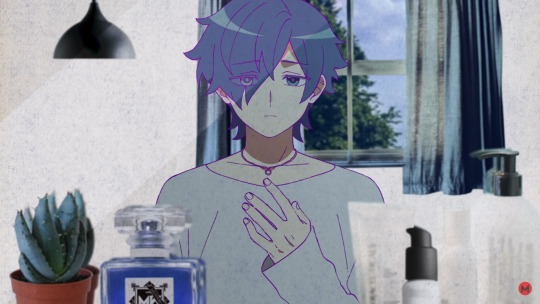
and a really similar looking younger child who just so happened to be a key feature of his memories (I don't have the vocabulary to explain it but its like cinematic parallels that establish this is the same person at different points of their life)

Its not impossible that this is Haruka's secret younger brother, but i think its unlikely. I saw someone saying they had to be different people because Haruka looks less happy than the child but like, most 17 year olds are less visibly happy than when they were 7 (or however old the child is meant to be). Life happens.
So when Haruka is shown pushing the child around and eventually strangling him, this isn't meant to be literal (homicide or suicide), but a representation of how conflicted Haruka feels about his younger self, who may have committed the murder (if you've ever been kept awake cringing at memories of something you said in the past and wishing you could go slap some sense into your former self, this is like that but 10 times more self loathing). The lyric "I am always repeating yesterday," implies he might think about this specific past event a lot.
Moving on, its pretty well accepted that Haruka's parents were abusive in some way and Haruka internalised a lot of it: he constantly apologises, he says in his interrogation questions that his one wish come true is that "[he] want[s] to be loved" and describes in his MV how when he couldn't find the words he was looking for ("you're unfair") one of his parents "would get angry at me and say “You’re hopeless.”". He seems to know its unfair but also still says he 'loves' his family, possibly mistakenly believing it is his fault, but also showing an awareness of his situation (and how his parents might behave).
Now, the MV is stylised in a way that makes certain details unclear, but there is one clear detail showing that Haruka's dog was killed

This is the first close up of Haruka and the dog. Haruka's mother is just out of frame supervising, but they look pretty happy. Notice how the puppy has a silvery chain for a collar. Somehow, this dog gets out of the house but only Haruka is shown chasing after it (whether his mother was searching elsewhere or didn't bother following her disabled son into the forest is unclear). Either way, young Haruka is now in the forest, unsupervised.
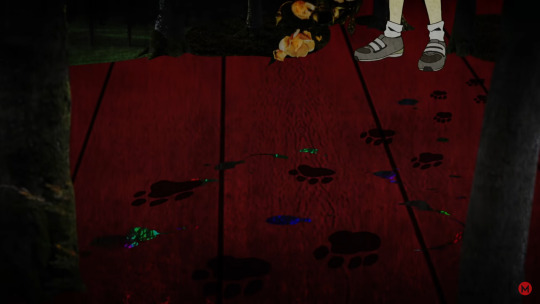
By the time he finds the dog, there is already blood, suggesting it was initally attacked by something else.
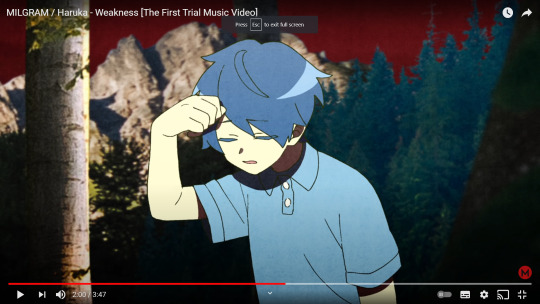
is this a sigh of relief from a boy whose finally found his beloved pet or a jealous weakling glad that nature took its course and he is finally free of that meddling mutt stealing all his mummy's attention? /j

I think this shock at the discovery that 'there is blood on his hands' could imply that rather than literally getting the blood from his dog, Haruka has seen his already injured dog and realises that if the dog got out because of him (he is previously shown to be aware his parents seem to blame him for everything) then he is the reason his dog is injured/dying and will be blamed for it. (this scene plays over the lyrics "It’s fine, though it’s really not It’s really fine, though I don’t really think so When I tried to understand it, You’ll make that disappointed face again" suggesting he is trying to avoid making his parents disappointed and letting the family pet escape into danger is something that could make them very disappointed)
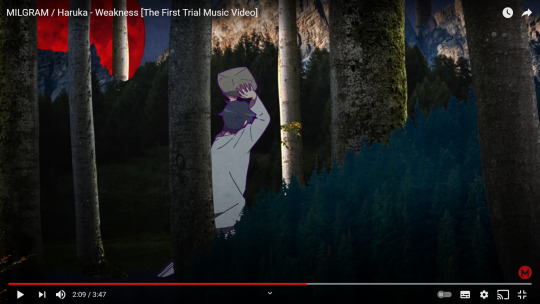
now we get into rock murder (this is present-day Haruka implying that this is either: not how the scene really played out; the writers really wanting the audience to know that this was Haruka's doing and not someone else's; or this turns into a separate incident that happened much later [although note that the red sky and blue moon is the same as when young Haruka first appears at the start])

b the corpse is beyond mangled now, but its clearly the dog because the silver chain collar is still there, to the right of the body. (circled in red for your convenience :3)
My hypothesis is: Haruka didn't set out to kill his dog, but upon finding it injured (we don't know the severity aside from bleeding and also it not being able to run away from Haruka kneeling down above it w/ a big rock so it could range from treatable with a lot of vet help to already on death's door, TBH I don't think Haruka would know the difference) He knew he'd be blamed for this; made into a villain who let the poor puppy come to harm. He panicked and killed the dog out of some idea that it would make him the victim here (since he'd be found crying over a dog corpse, which might make a parent go comfort him rather than getting angry about what could've happened to the dog). This is over the lyrics: "I cried, I screamed I wanted to be a pitied and loved weakling I was in denial, I was in denial I just had to make sure I’ve become a victim, I’ve become a victim" (there's another theory that he was also jealous of the dog, which could work here too, since this is not some calculated plot; rather its a rash decision) This ties in with his Japanese song title (translated as Weakness) which is a play on a phrase sort of like "The strong eat, the weak do not" to become "The weak are eaten by society" or "The weak eat each other to survive" [once again I am reminding everyone this is based on second hand information from the youtube comments section (from users mitchki and Alphaistic) because I do not speak Japanese] This second meaning (The weak eat each other to survive) makes sense under the reading that Haruka killed his dog in order to 'survive' making his parents disappointed for the dog escaping.
Miscellaneous points:
We don't know where Haruka's necklace came from yet, it must be a gift since the most expensive thing he's ever bought was cotton candy. The younger child in the video isn't wearing it and neither is his mother or the girl in the purple dress.
Haruka's home seems quite big, at the start we can see a large flower garden outside the window and there's a forest in walking distance. This might suggest his family is quite wealthy
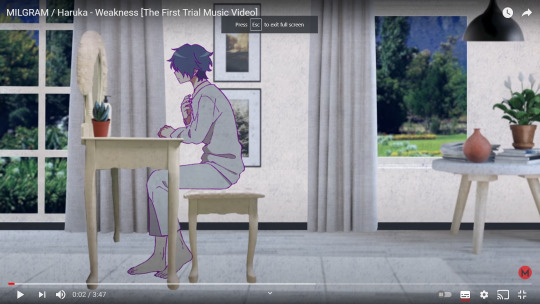
Haruka probably did go to school at some point as homeschooling is not a legally accepted as an alternative to public schools in Japan. (However it is estimated that up to 5000 families homeschool, this is uncommon) A lot (about 62%) of Japanese schools apparently have a 'special needs' classes and there are about 505 schools focused on educating intellectually disabled students (although I do not know which sort Haruka would've needed as whilst intellectual and development disabilities can be comorbid they aren't the same). Now, if children aged 7-14 don't go to school, their parents receive a fine, but its possible that if Haruka's parents are wealthy, they just paid it to avoid sending him to school. (This might imply they wanted to hide him or were generally ashamed of him in some way) However high school education (for students over 14) is not legally required and its likely that even if Haruka went to elementary/middle school, he hasn't been around people his own age in at least 3 years. As he seems quite lonely and glad that the other prisoners give him attention.
I don't think Haruka's parents are divorced and if they are, its not his father who left. Haruka mentions in the 30 questions that he thinks he disappointed his father. But still includes him as part of his family ("My father and mother and me"). A theory I've seen is that his father was disappointed by his son being disabled and left. but developmental disabilities (especially in non verbal and semi verbal children like Haruka) can be diagnosed before the age of 3, so I feel it is unlikely that Haruka would bring up his father if he left that early in Haruka's life
All MILGRAM prisoners have covered one of DECO*27's older vocaloid songs (DECO*27 is a well known producer who composes the music for MILGRAM) Haruka covered 'Two Breaths Walking' (https://youtu.be/puXLfVWrz2Q) which is about a boy's first relationship and how his mother's jealousy set him up for failure as the relationship becomes toxic (specifically it has some very funny out of context lines like "Whose breasts are you sucking on now?") so yeah, mommy issues: the song (Also: some people say in the song, the boy kills the girl at the end, but this isn't literal, TBW is the first of a trilogy of songs about the same relationship, it is followed by Android girl then Two Breaths Walking: Reloaded and the story resolves with the couple reuniting as adults and getting in the relationship again, although its not necessarily as abusive as before, its still implied to be codependant ending on the line 'We should live like oxygen tanks, sucking breathe from the words each of us exhale, until our last breathe')
In all seriousness, the scene where younger Haruka is walking through the city with his mother but it keeps repeating until older Haruka pulls the younger one away might indicate an attempt to focus the happier memories of his parents (since this is also over the lyrics "Why is it breaking? Tell me why? Please don’t change If I tried and couldn’t say it, You would get angry at me and say “You’re hopeless.”" which depict a worse scene) I think both his parents are still physically present but have become far more emotionally distant, not giving him as much attention, which exacerbates his loneliness from not having any friends his own age to talk to
And if one of his parents did leave? I think its likely his mother since she is shown disappearing out of his reach after the dog-incident (inferring she got angry/disappointed in Haruka anyway) This could also be where he got his necklace from: Its something his mother used to wear (although this is 100% a guess) and that's why its shown to be important to him
This one is just me, but i didn't realise until a rewatch that when Haruka is watching the younger him and the girl running together, the background has fireworks. Haruka mentions fireworks being a key memory to him so I wonder if this was one of the first/last times he got to make a friend...
On three separate occasions in the interrogation, Haruka mentions not liking animals. Despite this, he is depicted as sleeping with a rabbit plush and on his birthday art (I'd include that too but tumblr only allows 10 pictures per post, so here's a link) he is standing next to a giant blueberry and strawberry cake with two bunny themed biscuits at the side. Through my experiences of seeing Japanese fandom art on pixiv, sometimes rabbits are used to insinuate a character is cute and timid in fanart.
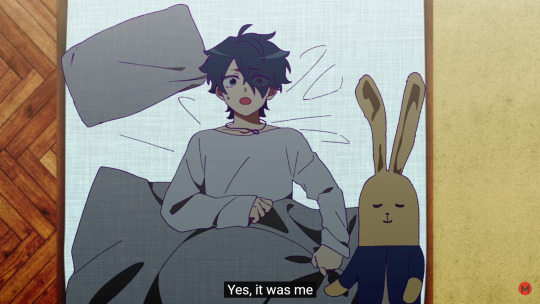
Meaningless details: Haruka sleeps with his necklace on; he sleeps on a bed and not a futon; at first I thought he woke up holding his plush's hand but his hand is merely next to the toy; and considering the state of the pillow and blanket, I wonder if he moves a lot in his sleep or if the is just because in this case he seems to be waking up from a nightmare about the dog incident...
Final note: I've spent so many hours writing this I don't remember if i was building up to any big finale or not but I hope you enjoyed reading this! Feel free to add on in the comments/reblogs.
70 notes
·
View notes
Photo
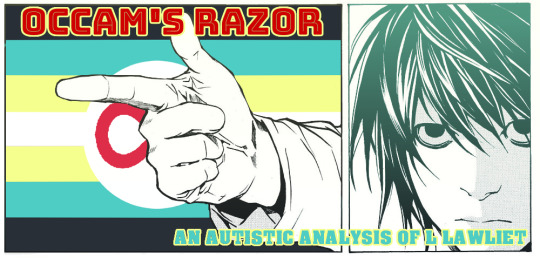
Occam's razor is the principle that, of two explanations that account for all the facts, the simpler one is more likely to be correct.
this post is going to cover traits specific to the manga and the television drama, since those are the best adaptations to showcase L’s autism. THIS POST is required reading before you read anything i’m about to type, because it explains what kind of character niche L falls into--an unintentionally autistic coded character. i’ll talk more about that at the end.
i’m going to talk about manga L first, since he’s the original version after all. i’m going to go in order of physical traits, to behavioral, to his character writing. also, tumblr eats posts that have outside links, so i’m going to have my non-tumblr sources in a separate post, here.
anyways, more under the cut!
MANGA/ANIME:
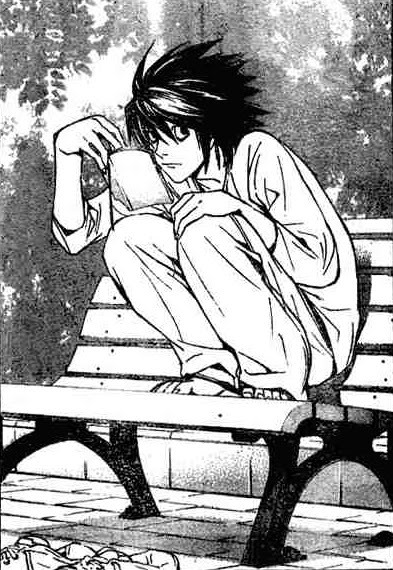
sitting with his legs up and spine bent / sitting on the floor
this is such a big one and its extremely common in ppl with autism. sitting in chairs normally is uncomfortable to outright painful w many ppl with these disorders, myself included. L sitting like that (which, to recall, is a blatant homage to sherlock holmes, another character that is so blatantly autistic coded you can find absolutely ridiculous amounts of writing on the topic) and being like "I HAVE TO SIT LIKE THIS TO THINK PROPERLY" is so autistic. like sitting in a certain way to give you specific sensory stimulus/avoid distracting discomfort and pain is a thing. i found this post (1) written by an autistic person on the topic of sitting in chairs being uncomfortable, and it says as much:
“I suspect that seating discomfort is common in autism (though by no means limited to autistic people). Many of us, particularly as children, benefit greatly from chairs designed to be non-stationary: rocking chairs, “fidget” chairs, and so forth. These can improve focus, compensate for proprioceptive hypo-sensitivity, and alleviate restlessness. In short, many “attention issues” can be fixed simply by providing a little motion for the person sitting. Small change, huge results. That's what accommodations do at their best. They make (often minor) adjustments that have profound impacts.”
so when L says that sitting the way he does, for a specific sensory experience, improves his ability to think, it’s perfectly in line with this idea. Also it’s a good pressure stim.
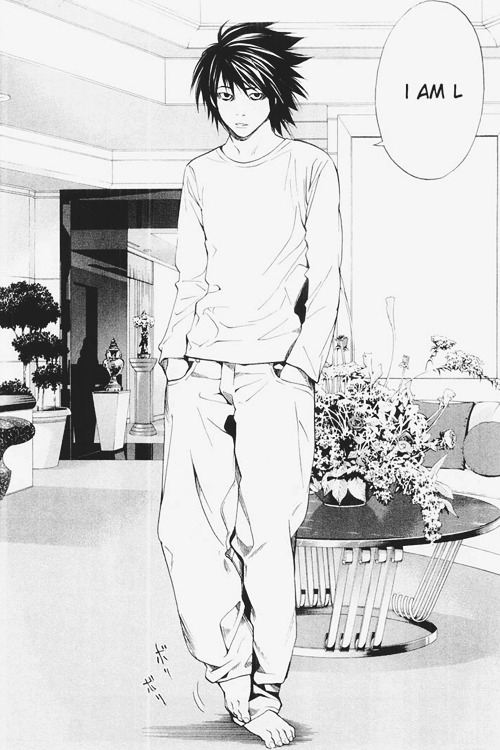
standing with a slouch / shifting his weight around
to begin: yes! it’s very common for autistic people to stand or walk oddly for a number of different reasons, from physical comorbidity to other issues such as dyspraxia (see: movie L). From an article by YAI (2), an I/DD (intellectual and/or developmental disabilities) community program:
“Kyphosis (a curved spine), collapsed chest, dropped shoulders and even scoliosis are observed in many of our patients. These myriad of postural issues may result from reduced strength, decreased biomechanical stability, or from a sensory impairment, such as apraxia.
Depending on the scene, L has mild to severe kyphosis which is very common in autistic individuals. Other things mentioned in that article if you want to click on it is instability in standing, where you sort of shift your weight around a lot between your feet or rest all of your weight on one foot, which L is literally doing the first time we see all of him.
speaking with a monotone voice.
i obviously can’t show a picture for this one and it honestly depends on the voice actor you find for L, but in the anime in particular L has a very flat tone. a lot of this is bc he has a dry sense of humor but. just know that it’s very common for autistic people to have a flat affect (or go the other way into being too loud/emotive).
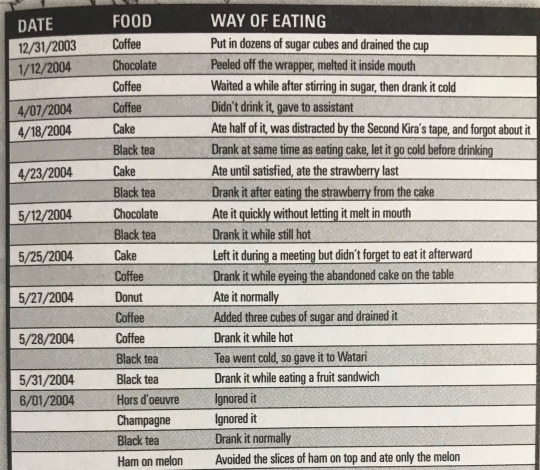
his eating habits.
a lot (a LOT) of autistic ppl myself included can only eat certain kinds of food for texture and flavor reasons. HOWEVER there’s a term in the autism community called “samefoods” which is really well put by tumblr users candidlyautistic and autism-asks:
“Samefoods or samefooding is a community word to describe the autistic trait of eating the same food over, and over and over . . . It is part sensory, part routine driven in most cases. A lot of times we samefood because we need that particular mouthfeel / texture / taste, and a lot of times even after that need passes, it turns into a need for routine until you actively dislike that food again.”
“Samefooding on the other hand is closer to a special interest. When I have a samefood (chocolate ice cream, currently), I really, really want that food. I could eat that food endlessly and not get tired of it. I will get upset if I’m not able to have the food in a day. For me, it usually is kind of routine based as well. For instance, with my current samefood, I have some in the evenings and it’s become part of how I wind down from my day.”
we don’t know exactly why L specifically desires sweet food or if he considers it part of his routine, but what we do know is that he really wants to eat sweet food and avoids eating anything other than sweet food, so it could either be that he’s a picky eater and can’t handle savory or he’s samefooding on sweets!
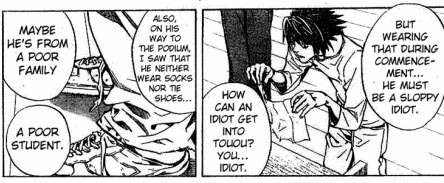
wearing the same clothes
L wears the same clothes every single day. It’s also worth noting that what he does wear is baggy, too-big clothing, the kind that wouldn’t be tight and uncomfortable. once again, sensory issues are a huge thing for autistic individuals. one of my favorite aspects is that in no adaptation does he wear socks. even L wears shoes, he wears them like slippers, not putting them on all the way. people comment that he seems like he’s poor, but we know for a fact that he’s very rich and that wearing these clothes is a personal choice he made.
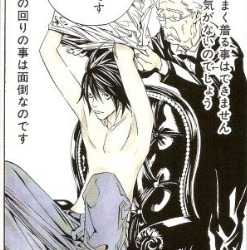
not caring for himself/outsourcing his self-care
i don’t think one day is exactly canon, rather it’s an exaggeration of what might actually happen--i.e. L doesn’t have a huge closet full of the same outfit, but he does have several versions of the same outfit on rotation; L doesn’t use a human washing machine, but Watari might help him/encourage him to bathe regularly. One Day is a parody comic, but it was made by the creators for a reason and that reason is that L pretty obviously relies on a caretaker (Watari) for his personal needs. Watari, in the manga proper, cooks and cleans and does most things for L. we’ll come back to this topic when we get to the drama though.

doing stimming behaviors
if you don’t know what stimming is, it refers to self-stimulating behaviors, usually involving repetitive movements or sounds. everyone stims to some extent, but in autism it tends to be more obvious, go on for longer, and sometimes be more disruptive to others. it’s often used to help deal with sensory overload, or used to express feelings--think of an autistic person being happy and flapping their hands in the air.
there are a LOT of instances of L displaying stimming behavior, from stacking his food or things on his desk, to spinning in his chair, to biting his fingers/using them to press on his lips, to wriggling and tapping his toes. here are some specific instances:
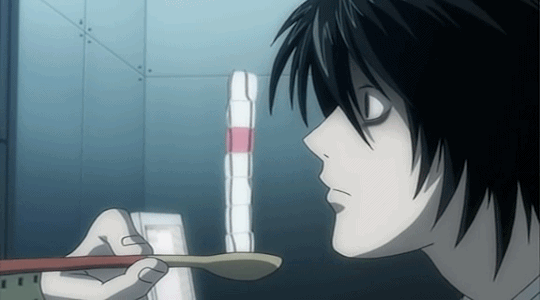
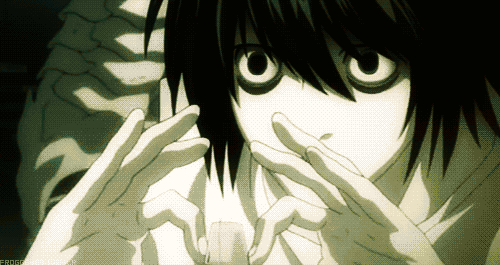
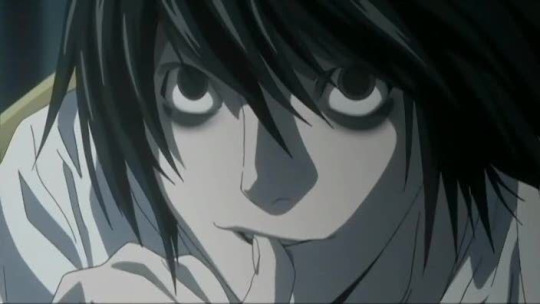
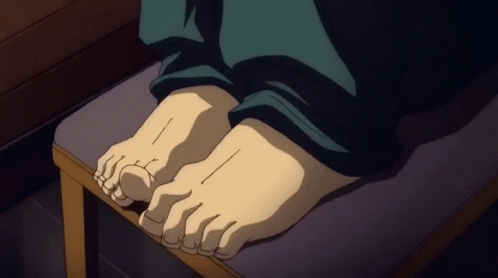
there are a lot more. i’ll talk about more when we get to dramaverse, but if you rewatch/reread death note it’s definitely worth noting whenever L does something like this!
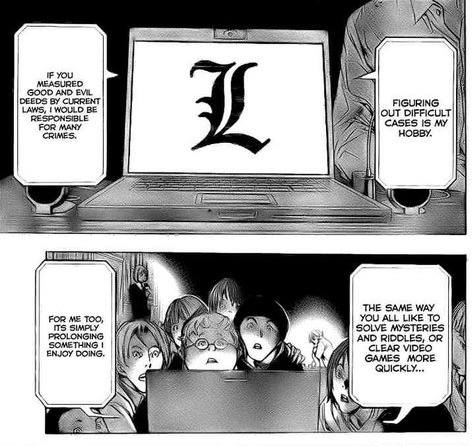
detective work as a special interest
ok, first and foremost i want to establish what a special interest is. Tumblr user cartoon has my favorite explanation of what a special interest is that i’ve seen to date:
“To have a deep, intense, passionate and incredibly focused / narrowed interest in a certain area of study, subject, topic or thing - to the exclusion of other interests. This interest is something that exists for the long-term, most often lasting for multiple months, years, or even you’re entire life “
L says that he only does detective work because it’s a hobby, and he finds it entertaining. We’ve also seen that he’s been at it for quite some time--if you take side content (the wammy’s house comic, LABB) seriously, then he’s been at it since childhood, with unwavering interest. it definitely comes across to me as L having a special interest in detective work, rather than it just being a normal hobby or a job for him, especially since he says it isn’t out of any moral obligation.
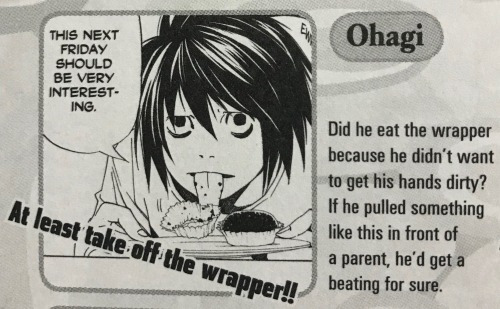
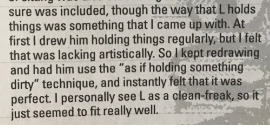
germaphobia
Germaphobia is very common for individuals with autism. a lot of the time it’s actually sensory issues associated with “dirty” things, and a lot of the time it’s because features of OCD are heavily comorbid with autism, including contamination OCD and such fears. regardless of the reason, though, L’s aversion to touching Bad Things is a very autistic behavior, and so is his resulting quirk that he tends to hold things in a very odd manner!

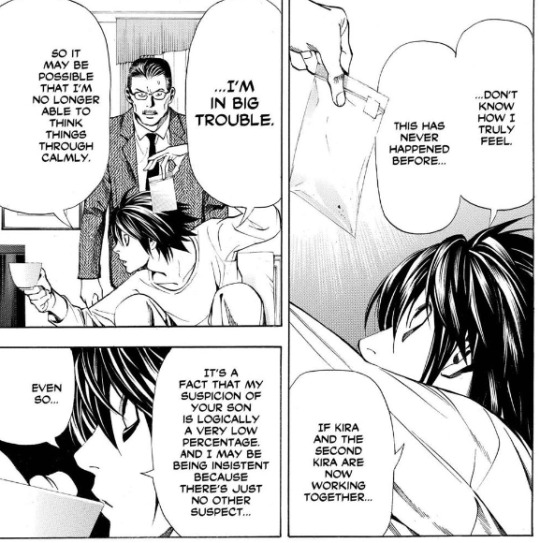
muted emotional expression
this is getting more into L’s character, but L tends to feel and express emotions in a very muted way. not to say he doesn’t have them, but for instance in the example above, L doesn’t have a solid grasp on what exactly he’s feeling. he thinks he might be acting irrationally and overemotionally because he logically should be afraid, but he isn’t sure, and none of these emotions present themselves visibly.
i’ve also seen it said that Ukita’s death is another good example of his muted response to emotion--he tells Aizawa to stay rational and his voice doesn’t waver as he tells him as much, but he holds himself tightly. for someone with poor emotional competence, these physical signs of distress can be hard to read in oneself, but Aizawa (a man who is extremely in-tune with his emotions) can tell immediately.
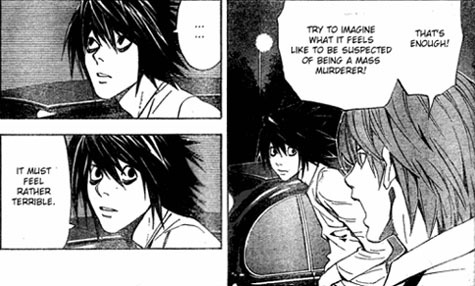
high logic, low empathy
L is also a character who, like many autistic people, lacks a certain degree of empathy. it’s not that he doesn’t have any, but it’s limited enough--and he values logic over it enough--that he’s willing to make extreme decisions and take a “ends justify the means” approach (such as using people as bait.) in the example above, L takes a moment to work through what it must actually feel like, which rings as very autistic.
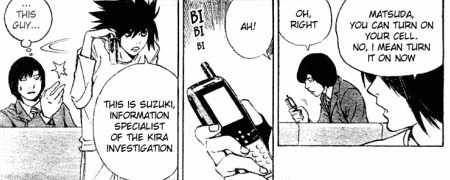
bluntness/not caring about social convention
there are so many examples of this i honestly could list them all day, but L is a character who is very to-the-point and doesn’t care about mincing his words. he can be outright rude to the people around him, especially if he considers them not worth basic courtesy. see: Matsuda.
DRAMAVERSE
if you all knew me you should have known this section is inevitable. i’m not going to talk about every single adaptation because i do not have the time and the only other adaptation that is meaningful in that regard is the movieverse (i am fairly certain that movie L is dyspraxic) but on account of the fact that i don’t care about them i won’t subject you all to them here.
anyway, drama L shows much the same traits as animanga L above (they are, after all, technically the same character) but he displays them in different ways.
he has a much more advanced degree of germaphobia, with Watari saying he’s sensitive to outside air and spraying everyone who enters his space with disinfectant, but not making them wash their hands or anything like that, so we can kind of tell that his issues are more rooted, again, in a fear of germs rather than any actual medical issue. he wants to feel as though he is clean, not necessarily actually be clean. this is very common in contamination OCD, which has a high comorbidity with autism. (my girlfriend has a very good headcanon post about drama L and OCD that isn’t so much analysis than just plain fun, but it’s worth a read!)
he stims, but he has a different array of stims than animanga L--he chews on his jelly pouch bottles,
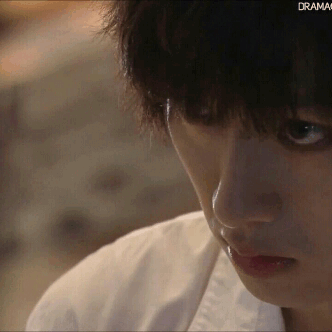
he tosses it between his hands,
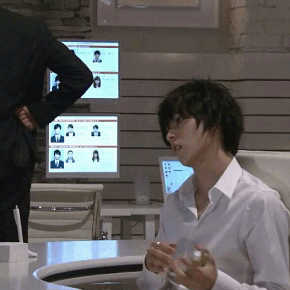
he kicks his feet,

and he bounces in his chair.

he still sits in an unconventional manner. he still samefoods, this time even more exclusively--he only eats Lucky Charge jelly pouches and nutritional bars. Watari onscreen puts his shirts on for him, as well as cooking, cleaning, and mending his clothes for him.
however, there are a few traits that are drama-exclusive that i think really add to an analysis of his autism!
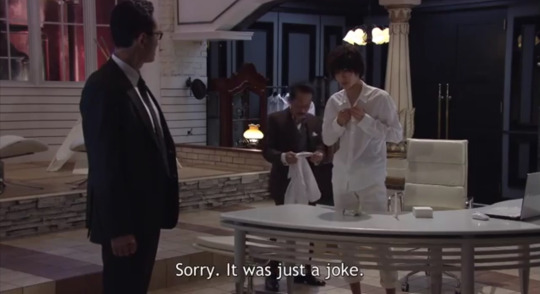
social scripting
social scripting and echolalic scripting are both commonly described as “scripting,” but are very different! echolalic scripting is like echolalia, but echolalic scripting is the recitation of longer passages of dialogue from things the individual has heard before. but social scripting is when you memorize common conversations so you can rattle it off without worrying too much! this can be very handy, such as exchanging basic pleasantries or ordering food, but it can also backfire if someone responds in a way your script’s not set up for. you can find more information on the difference in this video (3).
now, this relates to L in that there are two separate scenes where L says the same thing, rather inappropriately:
L: When I consider Kira’s personality, could it be that the strong-willed daughter is Kira? Or could that sweet-looking son of yours surprise us by proving to be him? You never know what humans are hiding beneath the surface... Soichiro: Enough. L: Sorry. It was just a joke.
-- Episode 2
L: Light-kun. Oh, I’m sorry... If I called you “Yagami-san,” it would be the same as what I call your father. Light: That’s okay. Call me whatever you want. L: Then what about Kira? (silence) L: It's a joke.
-- Episode 4
one could say that L just has a terrible sense of humor--and, of course, having a poor grasp of humor is common with autistic individuals--but the fact that he says nearly the same thing as a defense twice makes me feel as though he has it rehearsed as a defense when people react poorly to things he’s said, which happens often.
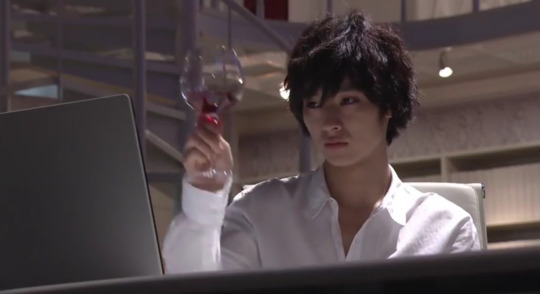
mirroring and echolalia
echolalia was briefly covered in the previous example, but for those unaware, via wikipedia (4):
Echolalia is the unsolicited repetition of vocalizations made by another person (when repeated by the same person, it is called palilalia). In its profound form it is automatic and effortless.
mirroring, on the other hand, is explained as such, also via wikipedia (5):
Mirroring is the behavior in which one person unconsciously imitates the gesture, speech pattern, or attitude of another. Mirroring often occurs in social situations, particularly in the company of close friends or family. The concept often affects other individuals' notions about the individual that is exhibiting mirroring behaviors, which can lead to the individual building rapport with others.
both of these are very common in autism, and they’re exemplified while L’s character is established watching his favorite TV show, Owarai Paradise. On one occasion, he’s watching the show and this dialogue happens:
Hiroshi: Despite never telling her how I felt, I still got dumped. I am Hiroshi. Watari: Who was this one again? L: He is Hiroshi. Hiroshi: I am Hiroshi. I am Hiroshi.
-- Episode 2
it’s important to note that in Japanese, “He is Hiroshi” and “I am Hiroshi” are said, at least in this instance, exactly the same, so L is echoing precisely what he’s heard.
On another occasion, L is again watching the show with a glass of wine (seemingly acquired simply to imitate the characters onscreen, as he never drinks it) and when the characters onscreen toast their glasses, L does the same, mirroring them.
CONCLUSION
I linked a post at the very beginning of this analysis talking about how characters are unintentionally autistic coded, and it’s important to understand how this unintentional coding is different from a headcanon--i didn’t make up these traits. they aren’t something that only exist in my head that i ascribe to L for fun.
i made this analysis both because i wanted to share L’s autistic coding in one cohesive place, because plenty of people have made lists before, but none that i could find that included so many examples with images and explanations--and i also made it because of the old ryuzaki persona “theory.”
for those unaware, the ryuzaki persona headcanon suggests that L faked all of these traits in order to make people uncomfortable, to put them off-guard and better mask his identity. i’ve seen posts about people claiming that nobody could actually behave in these ways, that L would surely be unhappy and uncomfortable sitting like that, or eating like that, or engaging in any of these behaviors. I’ve seen some people outright say that L isn’t autistic, but his persona is--that is, he’s pretending to be autistic.
i named this essay “occam’s razor” because, to me, L being autistic is the simplest answer to account for all of these traits. claiming that an autistic coded character is faking it is ableist and it just doesn’t make sense with anything else we know about his character.
but if you want to know more about that, i recommend reading eyecicles’ first!L tag. it’s debunked it in more ways than i ever could.
anyways, in conclusion
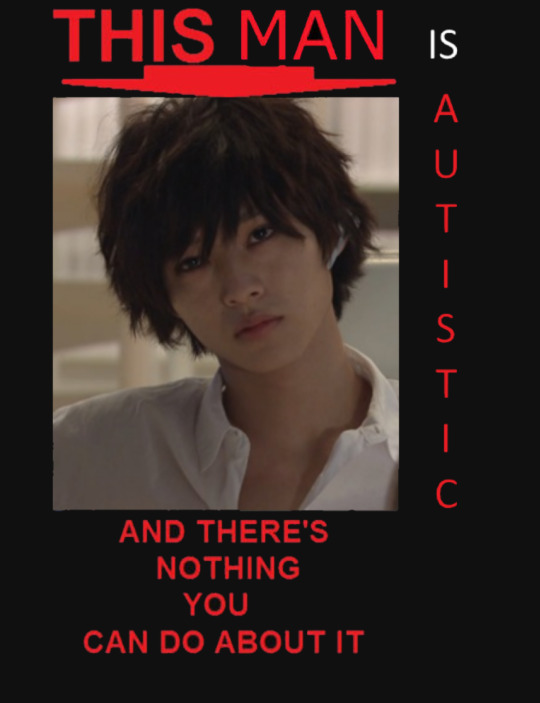
355 notes
·
View notes
Text
((*Note we are/our body is diagnosed with Combined Type ADHD, & our therapist suggested autism is comorbid, which we suspect we do actually have based on conversations with the autistic community & research (peer reviewed articles + the old diagnostic test (RASSD-R? RAASD-R? Something like that - some of y'all probably know what I'm referring too. I think we got a 205?)). Relevant to what this is about.
Also I use “™” (trademark symbol) to indicate “this is one section/thing” & “this is a ✨vibe✨” so that's what those mean))
---
Us for the past week or two (especially before work): Well, if ADHD meds are just stimulants, and caffeine is a stimulant, I can basically use coffee to self-medicate without worrying about unknown side effects (since I already know how caffeine affects the human body & how it affects us).
Us at work on caffeine, unmasked: *some tics (especially when tired/stressed), The Cups Must Be Arranged In This Pattern Or I Will Cry™ (portion cups for dips, we work in fast food), Sensory Overload Says Hi™, That Beeping Pitch Is Making Me Want To Rip My Skin Off™ (timers; angry fridge door got left open), Sauce Got On My Hands, Bad Texture, Get It Off™ (lots of extra hand washing), can't make eye contact to save our life (/mild exaggeration), Please Don't Touch Me™/avoiding contact, hyperfocused zooms, gets 2x to 3x normal work done like it's nothing, small head shakes (as if saying no) are soothing, going nonverbal every hour or two from Overstimulated™ because the beeps don't stop & having to type into a document on phone to communicate, Auditory Processing delays, Visual Processing delays, This Face Mask Is Grabbing My Face, Bad Texture, Make It Go Away™, can function without music but feel awkward & processing delays are worse without music, Words Are Difficult™ + Entire Dictionary Vanished & Everyone Is Speaking Simlish, I Understand Nothing™, collapse to the concrete shaking & immediate meltdown or shutdown as soon as work is over, lay in bed Too Overstimulated To Move/Exist™ for 2 to 4 hours as soon as we get home because need to recover*
Us at work on caffeine, masking: *dissociation, losing time, very long audio processing, everything gets internalized & shoved down, quiet/distant thoughts swirling, very dizzy*
Us this morning (before work): Yea no I don't feel like drinking coffee today.
Us at work (leading into after work), unmasked: *constant inner monologue, both narrating what we're doing & thinking about how the way we're doing it screams ‘I'm ADHD’, more intense & frequent tics (hard head shake, shaking hand off like it has something on it), need music to not zone out/get Choice Paralysis, more shaky hands, thoughts go zoom, losing large chunks of time, rearranging the pattern of portion cups literally every time we put another set out to fill because Too Similar Is Too Boring™, every little bit of movement draws attention & Must Look™ (cars, people walking, flashing lights, clocks), ✨S H I N Y, Must Look 😍™✨ (one of our favourite visual sensory things is silver &/or gold/bronze shiny metal), That Person Is Wearing A Business Suit To The Dentist, That's Odd, ¿Did They Just Leave Work? (& similar unhelpful distraction thoughts)™, Go Go GO/Must Move™, Pace Back And Forth Is Soothing™, Tap Fingers On The Keyboard™ stim (move fingers as if playing piano, but just tapping palm/other fingers/air), “EEEE” constantly in head, very awkward eye contact (Too Intimate™), immediate full body shakedown after work (5 hour shift) because ✨Need To✨™, goes for a walk immediately after work because Too Much Energy, Need To Move™ & Understimulated™, replacing words with other words that don't make sense or make little sense (e.g. “that's not what I was trying to make” instead of “that's not what I was trying to open”), people's voices are speaking so slow they sound far off & processing is difficult, Please Talk Faster™, Very Very.Easily Distracted™ (planned to do some self-care an hour ago, planned to read today 3 hours ago, but ✨Nope✨ Tumblr & distractions are too interesting)*
Us at work, unmedicated & masked: *inner monologue/brain background noise: “Old McDonald had a farm, and Bingo was his name-oh. B-I-N-G-O, B-I-N-G-O, B-I-N-G-O, and Bingo was his name-oh.” into the Jeopardy theme (doo doo doo do-do, doo doo doo), into the McDonald's jingle (“buh dah buh dah dah, I'm lovin it”); shaky hands, clumsy as heck, bouncing on toes, wiggling toes; humming to self, quiet whistling, hidden fidget cube in pocket quiet clicks*
Us: ...
Us: ...Well. Now that we've been medicated awhile I notice how much ADHD actually affects us because this is different. 😶
---
There's noticably different feelings, experiences, traits that we now notice. We've never medicated our ADHD before because didn't want pharmaceutical dr~gs, so we honestly couldn't tell what would be affected by meds or not (always dealing with ADHD on a daily basis). Being ✨medicated✨ showed us what was definitely ADHD & what probably wasn't, because we got used to not dealing as much with ADHD stuff & then today was all the ADHD things &....oh. ¿What we thought was Just/Still ADHD™ even though we were basically medicated was actually autism? 😶
Disclaimer that not every ADHDer will experience all of these & they may experience things we don't, & not every autistic person experiences all these things & they may experience things we don't. We aren't The Golden Standard™ for ADHD, autism, comorbid ADHD & autism, or neurodivergence. Also, some of these may be overlap as well, they’re not exclusive to ADHD or autism.
So....that's how our day went 😅. We weren't planning to be unmedicated with intent to see the difference, just didn't because too lazy to make coffee &...yea. apparently they //are// different, in ways we didn't predict/expect.
~Nico (he/they)
#medicated ADHD#ADHD#medicated#actually ADHD#actually neurodivergent#actually autistic#autistic#masking#meds#ADHD or autism#adhd adult#ADHD combined type#neurodivergent#actually adhd#self discovery#self diagnosis#self diagnosed autism#diagnosed ADHD
14 notes
·
View notes
Note
I don’t know if y’all have answered this before but what’s your opinion on the show The Good Doctor?
Hi, I want to be clear - we don’t really do reviews on this blog. We help writers write autistic characters more accurately. But! That doesn’t mean there aren’t some useful lessons on writing autistic characters from the show. In the future, a more useful question to ask is, “What mistakes or benefits does this show have in the way they’ve portrayed their autistic character(s)?” The more specific you can make your question, the easier answering it becomes. Let’s get into it.
The Good Doctor and its accuracy in portraying an autistic character:
I have seen all of season 1, and this show is paced well. If you plan on writing any shows, there’s something to be learned about making sure the pacing of the show is enjoyable. It has a nice balance of drama and resolution, and while there’s a couple of medical cases per episode, the characters’ personal plot arcs last much longer than an episode which keeps it from being stressful. This is a TV show though, and as usual story elements are exaggerated to enhance the viewer’s emotional responses… so the show is not without its drama. The Good Doctor has character arcs which last for several episodes at a time, and allow you to get to know a character. Most importantly, it allows us to see Shaun in a variety of contexts.
This show also has a deluge of very subtle messages about autistic people. There are a few intentional scripted explanations about Shaun being autistic yet competent, but the show is good at showing the messages about Shaun rather than clumsily preaching them. The show’s script uses a mix of person-first and identity-first language. People who like Shaun and dislike him have said he’s autistic, and similarly with saying he has autism. It seems like the show is written in a way that using both has a purpose, but I’m not exactly sure what that purpose is - perhaps to try to satisfy anyone who prefers either description?
Many people have problems with an allistic actor portraying an autistic character, and I won’t be getting into that argument or state my personal opinion, but the portrayal of accuracy in autistic characterization is very high. This is one of those rare shows which shows an autistic adult being competent in a job as well as navigating friendships and attraction to people. He is also shown as an autistic adult; he doesn’t think or act like a child.
Shaun’s strengths and struggles: My main contention with the show’s accuracy is the Savant Syndrome super powers Shaun (the main character) has, but I think that was in part a relic from the show being loosely adapted from a Korean drama of the same name. This could have a deleterious effect on the way the audience sees autistics’ skills and smarts - as something separate from autism. A more accurate way to describe Shaun’s skills would be his special interest has been in medical sciences and physiology for years, and he is a visual learner and can extrapolate spacial information from what he has learned about the layout of the body to understand medical problems on a deeper level. This is a set of skills and intelligence very related to autism instead of a separate thing stacked on top of it; he can hyperfocus and not get bored, makes abstract links between disparate pieces of information in order to reach a conclusion, can learn a system well based on visual patterns, etc. For him, these are very autistic traits. For another character, based on their learning style/preferences/personality the autistic traits can vary. Essentially, autism touches every way an autistic person experiences the world. The show makes this a clear message, at least.
While Shaun is excellent surgeon and very intelligent, he struggles with other things. This is very accurate for autistics; there may be some things autistics are very good at and/or have fun doing, but other activities can be difficult and distressing. For example, Shaun cannot drive because there is too much sensory information associated with driving. This is a very common experience, though not necessarily true to all autistics, and it doesn’t correlate with someone’s level of verbal communication. I know a non-verbal person who drives to her work every day, and a very verbal autistic who finds driving absolutely horrendous. At the end of the day, Shaun is very skilled but makes mistakes like anyone else, though his resolutions to problems are often unique, meaning he thinks “outside of the box,” or abstractly the way many autistics tend to. He follows rules yet is creative, something often unappreciated or overlooked in autistics’ portrayals.
Portrayal of sensory experience: Shaun dislikes eye contact and seems to pay attention to people by listening or looking at what they are talking about. His mannerisms and body postures seem to be geared around rhythmic gross motor movements and precise fine motor movements, navigating and interacting with his sensory environment. He also has a myriad of sensory problems, and the degree with which he struggles with them may vary on the situation. For example, he couldn’t deal with certain noises during the day, but he couldn’t sleep when the faucet wasn’t dripping because he wanted to have the familiarity of the dripping faucet. Autistic people have sensory preferences, meaning some people love certain sensory experiences others hate and vice versa. He also is visually very sensory-seeking and bought himself a high resolution flatscreen TV so he could watch it up close. This is something consistent with his character, since he thinks very visually. Shaun has a comfort item - a toy scalpel his younger brother got him and he carries it with him everywhere. This is similar to myself and a lot of other autistics, and it’s related to a loved one and a special interest.
He also struggled with being asked direct questions when he interacted with a character - Claire - up close and couldn’t answer them, but he had prepared for his interview and could respond to questions asked directly by strangers in that context earlier in front of a room full of people. Later, he can respond to Claire’s questions more easily, likely because he got to know her better. While it might seem counter-intuitive or poorly written for Shaun to have an inconsistent ability to answer questions, but the contexts in which he was asked certain questions were different, and he had different levels of preparation to be asked questions.
Emotions: In one episode he had an ‘atypical’ (at least by allistic standards) reaction to seeing someone get shot in a store - he compartmentalized his distress and feelings of guilt to help the person and go about his job, then later lashed out after he had packed his emotions down. He also didn’t want people to know his emotions. Yet some allistics are like this as well.The show writers leave him room to be similar or dissimilar to allistics, depending on his preferences and personality.
His facial expressions are so subtle, other characters may not catch them and be able to read his emotions. This contributes to the stereotype he is ‘robotic,’ but Shaun certainly does NOT emote flatly. His facial expression system is merely different from those around him. He is in pain/guilt a lot of the time and has been abused and bullied, so he learned to suppress his emotions rather than trying to deal with them because they can often be too much to handle. This is consistent with his character, yet doesn’t contribute to the idea that he doesn’t feel. Instead, he is portrayed as feeling a LOT: becoming attached to certain people quickly, feeling distressed if they are removed from his life either by dying or moving or cutting off contact. He often gets watery eyes but turns away to prevent people from seeing. It’s a choice of his to keep his emotions to himself; they’re his, as he asserts at one point.
Portrayal of Shaun’s history of abuse and bullying: Unfortunately, this portrayal is very accurate. Without spoiling too much of he plot, I will describe the types of abuse Shaun experiences. He was abused by his father verbally and likely physically, though the latter can be inferred. There is at least one scene showing this. His memories shown are mostly traumatic in nature - being kicked by classmates in the schoolyard, seeing death, and being pressured into take his pants off (though he didn’t, this is sexual harassment and humiliation) then surrounded by classmates and mocked. Autistic people are often targets for abuse of all kinds, and Shaun’s lack of obvious emotional reaction to his memories of these instances shows how acclimated to his memories of these kinds of violations he has become. Yet when he realized someone pretending to be his “friend” and manipulating him for his money, he was stung.
Portrayal of sexuality and romance: Shaun is shown as straight in this show, and becomes very attached to someone who also is interested in him. He seems intimidated by sexual experiences, but not disinterested in them - a very different portrayal of autistic sexuality than usual, as most autistics are portrayed as asexual. It is made clear he is interested in romantic experiences, and is shown as attractive.
Interactions with another autistic: There is an episode in which Shaun has an autistic patient (portrayed by an up-and-coming autistic actor). There was a little bit of weird ‘autistic whisperer’ feeling shown when Shaun translated the patient’s distress and the reasoning behind it, which may happen if autistic people know each other well or have similar sensory problems, but one autistic person may or may not be able to simply understand and explain another autistic person’s experiences.
Yet there was something interesting about this other autistic character which is not often addressed in media: he had different struggles and strengths than Shaun, different ways of communicating, and different responses to stress. Shaun internalizes his stress until he explodes, but this character seemed very communicative of stress and pain.
Something else interesting was Shaun’s initial almost-dislike of this character. Something gooshy to do on the writers’ parts would be to have them instantly become best friends, but to Shaun, he was just another patient, and Shaun had never met another autistic person. This was another way to show Shaun’s dislike of himself on some level (I would say self-hatred but I’m not too quick to point to evidence of this because the audience sees into his emotions only through memories and seeing him in private moments). Shaun has been taught by those around him there is something wrong with him, and he expected to find this patient difficult based on others’ historical communication to him that he is annoying or difficult to be around. Unfortunately, this kind of internalization of negative self-perceptions is very common for autistic people.
By the end of that episode, Shaun had seemed to get over his ambivalent feelings toward this patient and chided the patients’ parents for giving the patient a kava root supplement, as it was the cause of the patients’ presenting health problems. Allistic parents of autistic kids are often quick to jump to any supposed ‘cure’ or ‘support’ for their kids to change their autistic-ness, and this episode was wonderful at showing how dangerous this is, as the patient was in a severe amount of pain and distress. The parents were also very quick to decide both their child and Shaun were incompetent because of autism, but Shaun’s surgical team members were very quick to advocate for him despite their distrust of his skills in the beginning of the show. This gets at the show’s core message, I think: Autistic people are capable and one should assume competence.
This show is also not inspiration porn, since the narrative focuses on Shaun as the main character and doesn’t objectify him - a big plus in narratives featuring autistics.
Overall message about autism: In one episode, a physically disabled patient considering surgery to try to walk again tells Shaun, “You understand; you’d jump at a cure for autism, wouldn’t you?” And Shaun avoids the question by saying, “There is no cure for autism.” Shaun then prompts the patient to realize his best attributes - patience, willing to help others, etc. were learned because he went through physical therapy, and the patient says the difference between his ‘cure’ to walk again - surgery - and Shaun’s autism is the lessons he learned from being in a wheelchair wouldn’t go away if he can walk again. Also within this conversation, the patient told Shaun his wife married him because she accepted him for who he was, and that someone who accepted Shaun could marry him. Shaun pointed out some of his own personal qualities which are there because he is autistic. I winced at the initial question but the following conversation relieved me. This show, so far, communicates autism is a part of Shaun, not something he carries around which keeps the real him locked up.
Hope this helps with writing autistic characters in the future, especially in the medium of a show, movie, or play wherein there is a visual element for the audience in acting.
- Mod Siena
FAQ // Like my work? Please support me on Ko-fi
530 notes
·
View notes
Text
Autistic!Jasnah: Masterpost
Okaaay, so, as you might have guessed from the title, this post is a long list of reasons Jasnah Kholin is autistic af.
The short version: Jasnah is autistic because I, a Known Autism, say so. Have a nice day.
The long version (format): A long series of chronological quotes that all follow this pattern: Quote. *Insert ramble about why this is an Autistic Thing* *Possible and probable further ramble about why I’m emotional about that.
That’s literally it, people. Buckle up, I’ve picked through all three books (yes all three) to compose this post for y’all. It’s not going to be short.
To business:
The Way of Kings:
Jasnah glanced at Shallan, noting her, then returned to her conversation.
Introducing Jasnah ‘I don’t have time for social niceties I’m busy’ Kholin. From the first interaction she’s...Bad at interacting. Iconic.
“Then we shall do an evaluation. Answer truthfully and do not exaggerate, as I will soon discover your lies. Feign no false modesty, either. I haven’t the patience for a simperer.”
Jasnah is both blunt, direct, and honest in her speech as she is in her expectations from others. She doesn’t have the energy to deal with manipulation/lying/tarting up the truth to make it more socially acceptable bc she is a busy autistic lady with shit to do. (really, though, what she’s literally demanding here is the first rule of the autistic’s guide to easy conversation. Clear. Simple. To the point. To frills, no fuss.)
Jasnah didn’t argue further, and Shallan could see from her eyes that it was of no consequence to her if the king risked his life. The same apparently went for Shallan, for Jasnah didn’t order her away.
People do what people want to do and Jasnah doesn’t waste any time pretending she cares/that it matters to her for the sake of appearances. Again, this woman has a vendetta against typical social niceties and I love it.
“Now?” the king said, cradling his granddaughter. “But we are going to have a feast—”
“I appreciate the offer,” Jasnah said, “but I find myself with an abundance of everything but time.”
Do I need to point out the lack of social niceties again or are y’all sensing a pattern at this point? *King lovingly embraces his darling granddaughter that Jasnah just saved and orders a feast prepared in her honour* Jasnah: ‘Thanks but no I’m too busy to socialise.’
Jasnah was also a rationalist, a woman with the audacity to deny the existence of the Almighty himself based on her own reasoning. Jasnah would appreciate strength, but only if it was shaped by logic.
Jasnah feelings>>>>>>logic. This is a fairly common theme, of Jasnah being ruled less by emotions/sentiment/societal pressures/expectations and much more by logic/her own reasoning. She has her own way of looking at the world, her own rules for how it works, and she won’t be swayed by anyone else’s opinions on how she should feel/behave.
Jasnah turned to look out of the balcony into the dark space of the Veil. “I know what people say of me. I should hope that I am not as harsh as some say, though a woman could have far worse than a reputation for sternness. It can serve one well.”
Jasnah not being very self-aware in how people actually perceive her is also an autistic thing. Shallan notes several times that Jasnah is actually nowhere near as harsh/stern as she’s reputed to me, and, more importantly, she’s nowhere near as harsh/stern as she perceives herself to be. She also fails to note that Shallan actually enjoys the work/the challenge. This also implies that she takes what people say about her at face value and doesn’t have the necessary social skills to refute them.
Shallan tried to judge Jasnah’s mood, but the older woman’s emotions were impossible to read.
Again, this is a fairly common autistic trait. We struggle to read other people’s body language, but they often struggle to read ours as well. A part of this is probably Jasnah deliberately cultivating this kind of persona, but even so, she’s too unsure of how she comes across to have completely mastered this.
Jasnah carefully removed its contents, neatly lining up the brushes, pencils, pens, jar of lacquer, ink, and solvent. She placed the stacks of paper, the notebooks, and the finished pictures in a line.
Oh look, it’s one of the world’s biggest Autism Stereotypes (which I’m totally guilty of too): lining all the things up neatly, and making them Orderly.
At least with Jasnah one knew where one stood.
Jasnah of the straightforward, blunt honesty and ‘what you see is what you get’ strikes again.
When Jasnah was deeply immersed in one of her projects, she often ignored all else.
And here we see the Autistic Jasnah in her natural habitat: hyperfixating on her special interest.
The rest is under the cut for length!
Jasnah had elegant handwriting, of course—Jasnah rarely did anything without taking the time to perfect it.
Jasnah not doing anything unless it’s done Properly and Right according to her? Also Jasnah being indifferent towards things she hasn’t put any time into perfecting (such as drawing).
“I always forgive curiosity, Your Majesty,” Jasnah said. “It strikes me as one of the most genuine of emotions.”
Again, Jasnah encouraging/reacting positively to genuine/honest emotions because she doesn’t Understand the whole guile/lying/not being honest thing because honestly what is the point?
“Must someone, some unseen thing, declare what is right for it to be right? I believe that my own morality—which answers only to my heart—is more sure and true than the morality of those who do right only because they fear retribution.”
Honestly, just, this whole thing. For a start it’s a massive transgression of the Vorin social norms/expectations, especially for Jasnah as a prominent public figure as the sister to the king. For another it’s that internal rules thing again. Jasnah’s world operates according to Jasnah’s principles and Jasnah’s understanding of it, no-one else’s.
But Shallan had caught a handful of occasions, mostly when Jasnah had been distracted, and had apparently forgotten she wasn’t alone.
*Jasnah ignores social expectations so hard she literally forgets other people exist in the world* Also, again, the hyperfixation on special interest.
“And yet, those men are off the street. The people of this city are that much safer. The issue that Taravangian has been so worried about has been solved, and no more theatergoers will fall to those thugs. How many lives did I just save?”
“I know how many you just took,” Shallan said.
Jasnah has a habit of doing this, this very cold, calculated, logical and pragmatic way of seeing the world as well as morality. Shallan considers the lives taken, the emotional aspect of the moral dilemma, the horror of murder. Jasnah just sees it almost as statistics, as four lives taken to save many more. Shallan also focuses on the cold hard facts of ‘I know how many people you just killed’ while Jasnah is engaged in weighing up the probability of how many she just saved. (In theory, the thugs might never have attacked anyone again, so Jasnah might not have saved anyone by her actions, which I think is what Shallan is getting at here. But that’s just...A moot point as far as Jasnah is concerned)
This is also an example of her black and white thinking. There’s more net good in what she did than there is net bad. That’s where her questioning/reasoning stops because it makes sense to her. Shallan exists in the grey area, but I don’t think Jasnah even sees it in cases like this.
But it wasn’t the act itself so much as the cold callousness of it that bothered her.
This is an interesting one, and something I’ll talk about more a bit later, probably, but the way Jasnah comes across vs how she actually is. I totally get why Shallan views what she did as cold and callous, and in a way I suppose it was. It was fully planned and fully intentional. But I think for her it’s this kind of...separation between logic and sentiment. I think Jasnah feels very strongly and very deeply, but she doesn’t often display that to other people, and I also think she believes there’s a time and a place for that. Also, black and white thinking again. It comes off as cold to Shallan, but for Jasnah I think it feels more like common sense.
“You only needed to kill one of them.”
“No, I didn’t,” Jasnah said.
“Why? They would have been too frightened to do something like that again.”
“You don’t know that. I sincerely wanted those men gone. A careless barmaid walking home the wrong way cannot protect herself, but I can. And I will.”
Again, black and white thinking. (I’m also surprised this moment doesn’t generate more Discourse...Or maybe it does, I’ve just avoided it, either way) This is both a case for Jasnah not being able to predict people’s responses/behaviours, and also black and white thinking/internal rules at play. As far as she’s concerned those men are criminals. She has no assurances that they won’t hurt anyone else again. They’re already criminals, and there’s no chance for redemption or leeway, here. She’s made up her mind. They’re all criminals. They’re all dangerous. They all die.
Jasnah closed her eyes again, handing the brush toward Shallan. “Fifty strokes tonight, Shallan. It has been a fatiguing day.”
A)- routines the ‘tonight’ and the familiarity of this implies it’s something that happens every night. And the ‘fifty strokes’ is either another routine related thing, or an internal rule thing. Either way. Also this is probably a stim thing, since she’s using it to relax/de-stress.
Jasnah tapped her desktop with a fingernail.
Stimming.
“Brightness Jasnah does NOT like people entering her room. The maids have been told not to clean in there.” The king had promised that his maids were very carefully chosen, and there had never been issues of theft, but Jasnah still insisted that none enter her bedchamber.
Definitely, definitely, definitely an autistic thing. Issues with people entering Your Spaces or touching Your Things is a big autistic thing. (especially because the assurances about thieving don’t change her mind) Also the emphasis on not as in ‘this is a thing one absolutely does not do unless one wishes to die’.
“She’d believe me,” Shallan said. “She thinks she’s far more demanding than she is. Or…well, she is demanding. I just don’t mind as much as she thinks I do.”
Again, Jasnah taking what people say of her/how they say they perceive her at face value, and also lack of self-awareness in how people actually respond to her.
Jasnah regarded Shallan, face stiff, impassive. “I have been told that my tutelage is demanding, perhaps harsh. This is one reason why I often refuse to take wards.”
“I apologize for my weakness, Brightness,” Shallan said, looking down.
Jasnah seemed displeased. “I did not mean to suggest fault in you, child. I was attempting the opposite. Unfortunately I’m…unaccustomed to such behavior.”
Two things here: one, I’m like, 99% certain that Jasnah, who has been camped out at the hospital all this time waiting for Shallan to wake up is feeling anything but ‘impassive’ at this moment, in which case this is an example of her body language/facial expressions not matching up properly to her actual internal feelings, which is fairly common. And two: Jasnah’s apology being taken for a rebuttal and her obvious displeasure at it coming across that way when she literally intended the opposite (been there).
Also her general air of uncertainty/discomfort in this setting, which is one that’s obviously social/emotional. Also the fact that she pins her poor apology on lack of practice/familiarity with these kinds of interactions when, in theory, these kinds of things should come naturally to people. So like, lil bit of hinting/implication of scripting social things her, which I think her initial words reek of as well, as she’s said similar things before.
“You make it sound as if you were waiting out there.”
Jasnah didn’t reply.
“But your research!”
“Can be done in the hospital waiting chamber.” She hesitated. “It has been somewhat difficult for me to focus these last few days.”
“Jasnah! That’s quite nearly HUMAN of you!”
Again, a few things here, firstly that Jasnah is othered in a way by Shallan (and this isn’t the only time this happens, either) because of her lack of emotional response/social stuff. Secondly the fact that she’s clearly uncomfortable/struggles with this kind of conversation – the hesitation, the lack of responses are very much at odds with her usual composure and the way she has an answer for literally everything.
Words of Radiance:
She was all too glad to be leaving the stuffy room, which stank of too many perfumes mingling.
Prologue and we’ve already got Jasnah experiencing sensory issues in a crowded room with lots of perfume. What a way to kick things off.
“Many people consider that sort of thing enjoyable.”
“Many people, unfortunately, are idiots.”
Her father smiled. “Is it terribly difficult for you?” he asked softly. “Living with the rest of us, suffering our average wits and simple thoughts? Is it lonely to be so singular in your brilliance, Jasnah?”
A)- Jasnah obviously not enjoying social events/parties (she literally spends all of this one...contemplating the assassination she’s plotting. Like. Mood.)
B)- Gavilar’s comment is...Strangely sad, I think?? And perhaps a bit too on point. (This is very much just my reading of things but)...I don’t know. I see Jasnah trying to make a little quip/a joke here and it being misinterpreted because of her tone. And then, again, there’s that idea of othering that came up at the end of TWOK.
But I think the ‘is it lonely to be so singular in your brilliance?’ I think that....A huge part of that ‘brilliance’ comes from a mixture of Jasnah’s autistic traits: her special interest/her focus in them/her dedication to pursuing them...but also that sense of being other. Of not fitting in. The rest of “us” she doesn’t belong, she doesn’t fit.
And I think this idea of their ‘simple thoughts’ as opposed to Jasnah’s brilliant ones is a little like what we see with Renarin in Oathbringer, where Adolin explains that he isn’t trying to be lofty and brilliant, people sometimes just have difficulty following him. And I think this is what’s happening with Jasnah here (and in other places, she frequently talks about the difficulty she has in teaching, and how her methods are too intense and involved)
And also I think that....The saddest bit about this is that I think she was....Trying to joke here? Trying to fit in with those ordinary people, ‘the rest of us’, and just making a sarcastic joke on the back of her father’s comment about most people enjoying parties and she just sort of ‘well, most people are idiots aren’t they?’ And that’s what prompts this little moment here. So even when she’s trying to fit, and trying to belong, she’s still cast as the outcast, and misunderstood, and othered and it Hurts Me.
I, she thought, need to write this experience down.
She would do so, then analyze and consider. Later.
She literally topples into another world, effectively, and is just like ‘hm, I should make some notes on this and analyse them’. And. Yep. This is how she processes the world. By making sense of it, by treating everything according to Jasnah’s rules: it gets written down. It gets analysed. It gets understood. Bam.
Jasnah ignored the eyes of the sailors. It wasn’t that she didn’t notice men. Jasnah noticed everything and everyone. She simply didn’t seem to care, one way or another, how men perceived her.
Jasnah ‘I don’t have time for social expectations’ Kholin strikes again. Jasnah also just doesn’t care how anyone perceives her, social norms and expectations can go fuck themselves .
Jasnah grimaced at the thought. Shallan was always surprised to see visible emotion from her. Emotion was something relatable, something human—and Shallan’s mental image of Jasnah Kholin was of someone almost divine.
Again, the othering idea, as well as visible emotion being startling, as she’s typically so withdrawn/closed off/difficult to read. Yes friend, u guessed it, this is Peak Autism. Also the specific word in it being ‘relatable’ again marks that difference between Jasnah and...Everyone else. Again she’s different, again she doesn’t quite fit.
Jasnah relaxed visibly. “Yes, well, it did seem a workable solution. I had wondered, however, if you’d be offended.”
“Why on the winds would I be offended?”
“Because of the restriction of freedom implicit in a marriage,” Jasnah said.
Again, Jasnah misreading things/not being able to anticipate how people are going to react to different things. Also her view of marriage as ‘restricting’ says a lot about how she sees it/probably relationships in general.
Power is an illusion of perception.”
Shallan frowned.
“Don’t mistake me,” Jasnah continued. “Some kinds of power are real—power to command armies, power to Soulcast. These come into play far less often than you would think. On an individual basis, in most interactions, this thing we call power—authority—exists only as it is perceived.
“You say I have wealth. This is true, but you have also seen that I do not often use it. You say I have authority as the sister of a king. I do. And yet, the men of this ship would treat me exactly the same way if I were a beggar who had convinced them I was the sister to a king. In that case, my authority is not a real thing. It is mere vapors—an illusion. I can create that illusion for them, as can you.”
This right here is Jasnah explaining passing, without ever using the word ‘passing’. This is how Jasnah sees social interactions. They’re all illusions, they’re all, effectively, lies. They aren’t real to her. How people perceive others isn’t something that she can fit into her box of neat facts and logic. It’s this ever changing, insubstantial thing, ‘mere vapours’. And though she’s talking here about power and authority, the basic principle applies to literally every single social interaction ever. Aka: the secret behind how Jasnah Kholin (somehow) managed to convince ppl she’s allistic.
The orders of knights were a construct, just as all society is a construct, used by men to define and explain. Not every man who wields a spear is a soldier, and not every woman who makes bread is a baker. And yet weapons, or baking, become the hallmarks of certain professions.”
Actual footage of Jasnah Kholin going to war against social constructs and their flimsiness.
It was a picture of Jasnah, drawn by Shallan herself. Shallan had given it to the woman after being accepted as her ward. She’d assumed Jasnah had thrown it away—the woman had little fondness for visual arts, which she considered a frivolity.
Instead, she’d kept it here with her most precious things.
This is one of my favourite Underrated Jasnah Moments tbh because it says so much about her with such a simple gesture. We’ve established from the past book and a half that Jasnah is pretty bad when it comes to social interactions, and she’s even worse when it comes to displaying her emotions. But she’s not emotionless. She, personally, doesn’t see the value in visual arts, and hasn’t dedicated any time to it herself. Yet she keeps the gift that Shallan gives her. She understands how important this is to Shallan, and she quite literally treasures the art that Shallan gives her, and keeps it with her precious research/notes (and, like, Symbolism with her keeping her sentimental gifts and logic fuelled research in the same place/with the same level of importance/value, except one is hidden, and one is displayed)
And, like, Shall literally assumes Jasnah had just thrown away the picture?? And instead she’s got it kept safe with her most treasured possessions? Like??? The TL;DR version of this point is that Jasnah is horrendous at displaying her emotions/showing people how she feels about them/what they mean to her, but she feels things, goddammit. And now so am I.
What of this Sadeas? she thought, flipping to a page in the notebook. It listed him as conniving and dangerous, but noted that both he and his wife were sharp of wit. A man of intelligence might listen to Shallan’s arguments and understand them.
Aladar was listed as another highprince that Jasnah respected. Powerful, known for his brilliant political maneuvers. He was also fond of games of chance. Perhaps he would risk an expedition to find Urithiru, if Shallan highlighted the potential riches to be found.
Hatham was listed as a man of delicate politics and careful planning. Another potential ally. Jasnah didn’t think much of Thanadal, Bethab, or Sebarial. The first she called oily, the second a dullard, and the third outrageously rude.
She studied them and their motivations for some time.
Right. Now. Correct my autistic ass if I’m wrong, here, but I’m like 89% certain that ‘taking notes on the basic personalities/literally studying the people around you and making notes on the way they behave so you can actually understand them’ is not a typical allistic thing to do.
Shallan turned back toward him. That pride in his voice didn’t at all match what Jasnah had written of the man.
Jasnah can literally predict the oncoming apocalypse by the power of research, can she pin down some basic Facts about the people she’s observing around her? Nope. I wonder why.
“She wouldn’t let me be a mother to her, Dalinar,” Navani said, staring into the distance. “Do you know that? It was almost like . . . like once Jasnah climbed into adolescence, she no longer needed a mother. I would try to get close to her, and there was this coldness, like even being near me reminded her that she had once been a child. What happened to my little girl, so full of questions?”
Two things: one, this is probably (agonisingly) relating to whatever trauma Jasnah experienced as a child and I’ve got Painful Emotions about it. Secondly, Jasnah being very mature for her age/shucking Navani’s influence because it wasn’t what she thought she needed/wanted is, like, not exactly the most tactful/self-aware/socially conscious thing in the entire universe.
“You’re still human,” Shallan said, reaching across, putting her hand on Navani’s knee. “We can’t all be emotionless chunks of rock like Jasnah.”
Navani smiled. “She sometimes had the empathy of a corpse, didn’t she?”
Oh look, it’s canon low!empathy Jasnah: from the words of her own mother no less.
(Also, small note here, as a low!empathy autistic myself: I really love the way Jasnah is written because it complements my own understanding of empathy which is...Fairly complicated. Jasnah isn’t just like none and done here. It’s not that she just doesn’t feel empathy so she doesn’t care? She isn’t characterised as this brutal, unfeeling, robotic ice queen. There are a lot of nuances and complexities here as to how she relates to those around her and I love it.
She obviously loves her family very deeply, and is driven to protect and help them (in a very practical, logical way I might add. Which is typically how I relate to care/love as well. You want a shoulder to cry on? I’m going to sit there awkwardly, pat you on the head, and hope you stop soon. There’s a practical solution to your current problem? Heaven and earth will be moved to achieve it.) She keeps Shallan’s drawing, even treasures it. And I think that she obviously....Feels her lack of feeling (if that makes sense)
See: the hospital scene with Shallan where she attempts to apologise. She’s...Uncomfortable with the emotional aspect of things, and she’s completely wrong about Shallan’s intentions, and actually her actions as well. There’s a block there with the empathy...But that’s obviously something that doesn’t exactly...Sit right with her? She’s quite self-depreciating in that scene, actually, and it’s clear (to me, anyway) that there’s the sense of her being aware that there’s something...Missing. Something that...Doesn’t quite line up. Something that makes her different and stops her relating to people perhaps in the way that she wants to.
Anyway: don’t equate lack of empathy with lack of love: a novel by Brandon Sanderson. God bless. Intentional or not, this is one of the most relatable low!empathy characters I’ve ever read and I’m here for it.
“Chana knows, I wondered sometimes how I raised that child without strangling her. By age six, she was pointing out my logical fallacies as I tried to get her to go to bed on time.”
Shallan grinned. “I always just assumed she was born in her thirties.”
“Oh, she was. It just took thirty-some years for her body to catch up.” Navani smiled. “I won’t take this from you, but neither should I allow you to attempt a project so important on your own. I would be part. Figuring out the puzzles that captivated her . . . it will be like having her again. My little Jasnah, insufferable and wonderful.”
Again, a few things here: this concept of autistic children being far more mature/behaving like ‘little adults’ is actually pretty common. Also the puzzle-solving thing is just. Relatable.
Oathbringer
“Brightness?” Shallan said. “But … Shardblades aren’t fabrials. They’re spren, transformed by the bond.”
“As are fabrials, after a manner of speaking,” Jasnah said. “You do know how they’re made, don’t you?”
“Only vaguely,” Shallan said. This was how their reunion went? A lecture? Fitting.
Jasnah is believed dead for months on end, reunites with Shallan after who knows how long: immediately starts infodumping to her. Shallan:.......’Figured.’
People were always surprised to see emotion from Jasnah, but Dalinar considered that unfair. She did smile—she merely reserved the expression for when it was most genuine.
Jasnah back at it with the only bothering with emotions when they’re genuine. (Also Dalinar getting all indignant about people not understanding Jasnah/mischaracterising her is my favourite)
“They will try,” Jasnah said, “to define you by something you are not. Don’t let them. I can be a scholar, a woman, a historian, a Radiant. People will still try to classify me by the thing that makes me an outsider. They want, ironically, the thing I don’t do or believe to be the prime marker of my identity. I have always rejected that, and will continue to do so.”
Obviously she’s talking about her heresy here, but with a tiny smidge of tweaking it works well for her being autistic, too. She will always be a little bit different, always not fit, always be defined by being an outsider.
“In the face of such an atrocity, I would consider the sacrifice of one or more Heralds to be a small price.”
“Storms!” Kaladin said, standing up straight. “Have you no sympathy?”
“I have plenty, bridgeman. Fortunately, I temper it with logic. Perhaps you should consider acquiring some at a future date.”
Again on the feelings tempered by logic, thing. (Also Kaladin/Jasnah is interesting because they’re basically....polar opposites, and I enjoy the dynamic. But that’s for another day.)
“If you wish, Captain,” Jasnah snapped, “I can get you some mink kits to cuddle while the adults plan. None of us want to talk about this, but that does not make it any less inevitable.”
“I’d love that,” Kaladin responded. “In turn, I’ll get you some eels to cuddle. You’ll feel right at home.”
Jasnah, curiously, smiled.
Jasnah: approves of frank, honest comments. Even if they’re mildly insulting. As long as they’re genuine.
They didn’t talk tactics too specifically; that was a masculine art, and Dalinar would want his highprinces and generals to discuss the battlefields. Still, Shallan didn’t fail to notice the tactical terms Jasnah used now and then.
In things like this, Shallan had difficulty understanding the woman. In some ways, Jasnah seemed fiercely masculine. She studied whatever she pleased, and she talked tactics as easily as she talked poetry. She could be aggressive, even cold—Shallan had seen her straight-up execute thieves who had tried to rob her. Beyond that … well, it probably was best not to speculate on things with no meaning, but people did talk. Jasnah had turned down every suitor for her hand, including some very attractive and influential men. People wondered. Was she perhaps simply not interested?
All of this should have resulted in a person who was decidedly unfeminine. Yet Jasnah wore the finest makeup, and wore it well, with shadowed eyes and bright red lips. She kept her safehand covered, and preferred intricate and fetching styles of braids from her hairdresser. Her writings and her mind made her the very model of Vorin femininity.
Jasnah just not caring about social/cultural gender norms. Jasnah does what Jasnah wants. But also, gender roles, and tbh the entire concept of gender, is a social construct, it’s something a lot of autistic folks struggle with. (Also non-binary/agender!Jasnah just, as a fun little aside)
“Surely,” she said softly, “if Jasnah had known that I’d just confronted a deep insecurity of mine, she’d have shown some empathy. Right?”
“Jasnah?” Pattern asked. “I do not think you are paying attention, Shallan. She is not very empathetic.”
A)- Jasnah probably didn’t notice and B)- low!empathy Jasnah again.
Jasnah rubbed her temples. “Storms. This is why I never take wards.”
“Because they give you so much trouble.”
“Because I’m bad at it. I have scientific evidence of that fact, and you are but the latest experiment.” Jasnah shooed her away, rubbing her temples.
‘I have scientific evidence of the fact I’m not good at mentoring/teaching/with people in general’ actual quote from Jasnah herself. Also, just, the language here? The mentoring/taking of wards is an intimate social relationship in Vorin culture, but the way Jasnah speaks of it she uses words like ‘scientific evidence’ and ‘experiment’ which says a lot about how she views relationships in general tbh.
Also, I think her self-consciousness is something that’s interesting to note. This isn’t the first time she questions her teaching abilities/methods, in fact it’s one of her biggest and most obvious insecurities, it’s something that she’s very aware of. She knows she’s bad at this, and it bothers her.
“Ivory, you think all humans are unstable.”
“Not you,” he said, lifting his chin. “You are like a spren. You think by facts. You change not on simple whims. You are as you are.”
She gave him a flat stare.
“Mostly,” he added. “Mostly. But it is, Jasnah. Compared to other humans, you are practically a stone!”
[…]
“Jasnah?” Ivory asked. “Am I … in error?”
“I am not so much a stone as you think, Ivory. Sometimes I wish I were.”
And again with Jasnah being factual-based when it comes to her decisions ,and emotions based when it comes to her motivations. Jasnah Kholin feels things so deeply I will physically fight you over this matter. Also, given what we’ve seen, it definitely seems as though Ivory/Inkspren/Jasnah’s ideals are concerned with logic/reason/rightness, and that being a defining aspect of her/her order is interesting in the context of her being autistic.
Renarin still lurked at the far side of the room, mumbling to himself. Or perhaps to his spren? She absently read his lips.
Since, as far as we know, Jasnah isn’t deaf/hoh, the lip reading is something she acquired for other purposes. Probably as part of her paranoia/wish to protect her family, but it’d also probably help with auditory processing disorder. Which is basically where your ears hear words fine, but your brain scrambles them up and fails to make sense of them. Also a lot of autistic folks (self included) tend to watch people’s mouths instead of their eyes (bc eye contact Sucks) and I’m not saying I can lip-read, but if I could it’d definitely make life easier.
But when, before this, had she last heard him laugh?
“Maybe,” Navani said, “we should encourage him to take a break and go out with the bridgemen for the evening.”
“I’d rather keep him here,” Jasnah said, flipping through her pages. “His powers need additional study.”
Navani would talk to Renarin anyway and encourage him to go out more with the men. There was no arguing with Jasnah, any more than there was arguing with a boulder. You just stepped to the side and went around.
Jasnah being completely and utterly oblivious to the hidden agenda/undercurrent to Navani’s thoughts which is ‘Renarin is comfortable with the men/is enjoying himself with them, maybe we should encourage that?’ and just responds to her mother’s words and nothing else. The boulder analogy makes me laugh (but also recalls what Ivory said about her being ‘stone’ which is, again, a kind of othering, a setting apart of the ‘normal’ humans, based on how she emotes/deals with things/processes fact.
I’m sorry, Mother. I’ve been dealing with a lot of lesser ardents today. My didactic side might have inflated.”
“You have a didactic side? Dear, you hate teaching.”
“Which explains my mood, I should think. I—”
A lot of autistic folk find it difficult to teach people, largely because, if they explain something in a certain way, away in which they understand, they have trouble rephrasing it/altering it to make other people understand it as well. Can definitely, definitely see Jasnah struggling with this.
Jasnah preferred to work alone, which was odd, considering how good she was at getting people to do what she wanted.
This shocks me to my very core so it does.
Next to her, Jasnah stood with arms wrapped around herself, eyes red. Navani reached toward her, but Jasnah pulled away from the others and stalked off toward the palace proper.
Oh look, it’s touch!averse Jasnah. (she’s really not very touchy feely at all) Also Jasnah not knowing how to deal with her emotions/grief and withdrawing from people around her. Also I’m calling the arms wrapped around herself as a pressure stim. Fight me.
Jasnah met his eyes, chewing her lip as she’d always done as a child.
Jasnah having anxious!stims (that she probably forced herself to unlearn)
“Forget I asked,” Dalinar said, sharing a look with Navani and Jasnah. Navani smiled fondly at what was probably a huge social misstep, but he suspected Jasnah agreed with him. She’d probably have seized the banks and used them to fund the war.
Jasnah ‘fuck your social niceties, I have a war to win’ Kholin.
Suddenly they were young again. He was a trembling child, weeping on her shoulder for a father who didn’t seem to be able to feel love. Little Renarin, always so solemn. Always misunderstood, laughed at and condemned by people who said similar things about Jasnah behind her back.
Mm, who else was ‘solemn’ as a child? Maybe ‘correcting logical fallacies at age six’ ‘no longer needed a mother when she reached adolescence’ Jasnah. And, like, ‘people mock Renarin for his autistic traits...Jasnah is also mocked for having these exact same traits.’ It’s basically canon, people.
Jasnah fell to her knees, then pulled Renarin into an embrace. He broke down crying, like he had as a boy, burying his head in her shoulder.
Also, the fact that Renarin instinctively went to Jasnah for comfort, not Navani, who eagerly mothers literally everyone around her, or anyone else, he went to Jasnah ‘empathy of a corpse, made of literal stone’ Kholin for comfort and support tells me something. It tells me that these two had an understanding. That Jasnah understood Renarin, and that Renarin understood Jasnah, and that there perhaps a reason for that that has to do with their shared brain weirdness.
This is also the first time, as I recall, that Jasnah responds with physical affection. (And this doesn’t undermine what I said about her being touch!averse, she is, but a)- she initiates this contact and b)- it’s with someone she’s clearly comfortable with this level of contact)
Jasnah glanced over her shoulder at the gathering army. “And perhaps … this is one time when a lecture isn’t advisable. With all my complaints about not wanting wards, you’d think I would be able to resist instructing people at inopportune times. Keep moving.”
I have said it before and I will say it again, Jasnah infodumping to an exhausted Shallan in the middle of a fucking battlefield is the most autistic thing I have ever witnessed in my entire life.
These had always been right. Until today—until they had proclaimed that Jasnah Kholin’s love would fail.
And, to summarise it all neatly, Jasnah Kholin, empathy of a corpse, heart of a boulder, whose love in the end never failed her. *wipes tear* my beautiful autistic queen is good and full of love and feeling but just being really bad at showing it to people. We do not deserve her.
TL;DR: Jasnah is autistic af. It’s basically canon. Fight me.
#jasnah kholin#renarin kholin#shallan davar#dalinar kholin#navani kholin#Oathbringer#Brandon Sanderson#Stormlight Archive#Oathbringer Spoilers#text post tag#autistic!Jasnah#jasnah meta#stormlight archive meta#cosmere meta#my meta#headcanons#my headcanons#jasnah headcanon#agender!jasnah#might as well tag that too#long post#actuallyautistic#autistic headcanons
335 notes
·
View notes
Note
I'm not sure if you're awake right now but I wanna ask, can you describe some things your ocd causes(I don't know if that's a good word to use but it's all I can think of) you to do? I'm wanting to write a story involving a character with ocd, while I'm doing research I remembered (I might be wrong though so feel free to correct me) that I think you said somewhere before you had it and since you kind of inspire me to go after things I thought I ask. If it's too personal feel free to delete!
Also, ocd story anon, I read that trauma can be a cause of ocd, do you believe that your ocd could've come from your trauma?
This is a very very long response going into a few of my (and some alters) OCD traits and some reasoning behind them and the range of responses I have to various triggers. It actually helps me analyze my traits better when ppl ask stuff like this so I may have gone overboard as stuff kinda clicked in my brain but hopefully somewhere in here you will get your answer.
So, I’m going to start with the last question first. MY OCD was not caused by my trauma, however my traumas have completely shaped my compulsions and obsessions to a point where my OCD traits are almost inseparable from my PTSD. See, I’m autistic, and OCD is part of this co-morbidity package a lot of autistic people end up with, to a point where the co-morbid disorders are often not even diagnosed after the autism is because its that common. (They’ll diagnose separately if you need treatment for one of them. like the reason i have ADHD and OCD listed as dx’s is because the doctors count them separately on me bc i need medication for them, but they’re extremely common to the point of being expected with most ASD dxs)
Yes, I have OCD and have always had, but my trauma caused so much anxiety that the disorder reshaped itself around specific triggers. There are many layers to my OCD, it’s actually a strange sort of nonspecific looking presentation because of how many alters also have OCD, so it becomes difficult to tell who has which O and C thus there being a lot of inconsistency in whether or not a trigger affects me.
It’s also worth nothing that some doctor’s feel that I fit under the specific label of “scrupulosity” or rOCD (Religious OCD) because of how much of my stuff revolves around religion. I don’t always agree that it’s this because while my O and C are based on religious themes, I don’t believe in the concepts behind the things. I believe most of the religious stuff is just from religious trauma.
On one layer, I have a number obsession. There are certain numbers that are tolerable, a few that are “cursed,” and one that is “blessed” and one that is “perfect.” I will do anything to change things to match my blessed and perfect numbers. I will even fudge the truth a little (not a lie, often an exaggeration, by about one or two digits) to make something fit those numbers. To randomly come across a cursed number or even just a slightly intolerable one, makes me very anxious and can shape how i spend my day and how much time i spend with my better numbers. The way my trauma shaped this compulsion was that my numbers tie to religious stuff, since my traumatic environment was often religious, or trauma would be inflicted with religious reasons.
There is an alter that has a compulsion to say a prayer. When we have intrusive thoughts (which you super need to research if you’re writing OCD bc it is a KEY PART of the disorder but ill go into it later here), someone starts reciting the prayer. Sometimes I will as well just because it’s easier to go along with it. Not completing the prayer is not an option. I mean that with absolutely every intent. Not completing the prayer is NOT AN OPTION. It does elieviate some background anxiety, so whoever is dealing with that is being helped by the compulsion, but it is extremely frustrating and upsetting, especially since i am as non-religious as i can possibly manage to be. The prayer is also said whenever something is uneasy or something triggers specific flashbacks.
One of the most obviously noticeable and upsetting for all involved O and C is being “dirty.” There’s a VERY wide range of triggers here, from actually dirty/germy/unclean things, to unpleasant/intolerable sensory triggers, all the way to conceptual dirtiness like sin, virginity, and lying. This can affect me subtly sometimes, like how i compulsively tell the truth and over share so that i feel clean or how i cannot go to sleep after a fight if it has not been resolved. (”never go to bed angry” they said, well shit now i literally cant cool.) This can also hit me violently and to a point where I am a danger to myself. I worked at a movie theater for a summer some time ago and touched something that was a bad sensory feeling while cleaning a dirty theater. I then proceeded to scrub my hands in near-boiling water for almost fifteen minutes in the break room, broke down sobbing, and when I got home i sat under very very hot water in the shower until my skin was raw and red for days. It doesn’t often get to that point, but when it does, I’ve been held down for my own safety since I’ll literally rip my skin and bite myself to punish myself for being dirty. It is frequently bad enough that I will let myself do something “dirty” as a form of self harm since it seriously makes me miserable and sick. This stuff comes both from religious trauma and from just....crappy normal autism feelings and manifests as my most disabling OCD trait.
There are other things like closing drawers and straightening and arranging things that are done to feel that I am being “good” because of reprimands I received in the past that made me feel like I am “bad.” I am sometimes able to not act on these compulsions, though it takes conscious effort to choose not to. Whether or not this stems from trauma doesn’t really matter to me. I know that most of the fronting alters have these “little OCDs” be it through me or for their own reasons. Tia for instance has to keep things in the kitchen a certain way and Phoebe has to complete certain physical activities a certain way or else she gets upset or feels she did a very bad job/failed.Since I’m really just. going at this question lmao lets talk a little about intrusive thoughts. Intrusive thoughts are upsetting/disturbing/unacceptable thoughts you do not take pleasure in. For me, a few of them make me feel dirty, which triggers my compulsions very badly. Some relate to trauma, others don’t make sense. There are very common ones such as urges to kill or mutilate self or others, urges to do disastrous things (like causing a huge car accident), urges to do disgusting sexual acts (to self or others, often to unacceptable people like children, elders, and the undesired sex), urges to become a serial killer/rapist/shooter/etc, and other such painfully upsetting things such as those. These are often what fuel the obsessions in OCD and the compulsions are to make these thoughts stop or hurt less. Personally, I get a lot of sexual ones because of how poorly the topic was handled in my childhood. I get ones about elaborately slaughtering a specific abuser, about doing things that will kill me, about mutilating myself and mutilating pets (those are the ones that fuck me up the most i think), and about doing very destructive things that would harm a lot of people. I also get some about terrorism happening where I am, but that one is FOR SURE a trauma thing so maybe it could just be my PTSD.
Intrusive thoughts occur with a LOT of different disorders!!!!! It’s just OCD when you have compulsions to cope with them. Even then, it has to be a certain way for it to qualify.
I hope I was able to give you somewhere to start in terms of information. OCD is a very big disorder and is a major reason why I’m unable to function in a workplace environment. I didn’t go into the specifics of every compulsion, but if you have questions, I don’t mind talking about this stuff. It helps me process it to explain it to others and I end up healing a little through oversharing I think.
12 notes
·
View notes
Note
hey i sent you an ask but internet problematic here so i dunno if it was sent? As someone with no experience with neurodivergent people i was hoping you could elaborate what you have previously said about Kars in JORGE JOESTAR (and other characters maybe) seeming neurodivergent. Like, i'd love to know your headcanons about jojo characters regarding this, as well as reasoning for the headcanon's (optional, but i'd love it)
(wow this one sure took me a long time to answer, sorry!)
oh boy, this would be an extremely long post if I included all other jojo characters I headcanon as nd so I’m just going to focus on Jorge (the Japanese one) and novel Kars for now
this won’t be a “this character definitely has x thing”, but just pointing out traits and dialogue that may interest someone who wants to headcanon/write these characters as nd
am I going to be reaching with some of those? yep! but if the Jorge Joestar novel itself taught me anything, it’s that:

so, you know. I see what I wanna see.
(tw: mental illness, trauma, ptsd, suicide - all in the Kars segment)
Jorge:
– the sheer difference in introductions is telling: English Jorge talks at length about his family, his classmates, his gay puppy crush, and anything else you’d expect to be major concerns for a kid. Japanese Jorge? social life haha what social life, HOPE YOU’RE READY FOR 10 PAGES OF PUZZLE SOLVING
– no really if the very first thing someone says after seeing all your memories is that you sure spend a lot of time on puzzles then that’s some deep interest you have, a bit of a stereotypical hobby there but whatevs
– hyperfocuses a lot??
– (exasperated Kars who’s been trying to get his attention for a good minute:) “You have a bad habit of not hearing when people speak to you.” (Jorge:) “Yeah, if I’m focused on something else. Sorry. What?”
– tunes out of one phone conversation with Bruno like 3 times
– figures out how time-based Stands work specifically because he has experience with his internal sense of time getting royally fucked up whenever he’s deeply focused
– was inattentive (and hyperactive?) as a young kid to the point it affects how the memories on his disc look like: “I was a fidgety child, and the image rarely focused on [Joseph] for long. I wasn’t interested in his story.”
– visual thinker, good with patterns, can make complicated mental maps and solve slide puzzles in his mind
– his memory is really good until it isn’t (as far as he’s concerned Funny Valentine’s Stand is called Dirty Whatever)
– very particular about meanings of words and names, etymology (his arc starts and ends with him pondering over the kanji of his own name, knows latin names of various species like Hydrangea or Ursus maritimus and what they mean literally, that “sorry that name’s taken” line when Rohan calls something a Beyond, etc)
– doesn’t like (is distressed by?) clutter and things/details being WRONG. (“If details don’t add up right I get agitated, and start searching for a better way. This trait has lead to my room being very clean, and made me a great detective.”)
– infodumps to Rohan about polar bears of all things, and there’s a moment when he stops talking almost mid-sentence after mentioning they’re called Ursus maritinus and instead of speaking out loud he just thinks to himself that “The scientific name was given by John Phipps in 1774” as if he just realized that’d be Too Much detail to share, I feel you Jorge
– (after Erina says he has a characteristic soft smile) “I do? I mean, I guess people do say I look like an idiot.” <– I feel you Jorge v 2.0
– gets urges to laugh at very bad times (”Cars’ whispered response had an air of such grim realism that I almost started laughing, but he was watching me suspiciously. Whoops.”)
– sometimes blurts out things, often fails one-liners, even when he pre-plans what he’s going to say something else may come out (“I’d thought of all kinds of things to say, but what actually popped out in that moment? (…) I have no idea what I meant by that last bit but I said what I said and had to live with it.”)
– sometimes impulsive, like yeah let’s just get up in the middle of the night and search through a 10 km^2 area on a bike for something unprecised while you have several death threats to your name, this can’t possibly backfire
– (after Jorge quite literally blows himself up by impulsive carelessness) “Cars was still laughing. “You really don’t think things through.“”
– small point that’s made moot by paranormal things like that being real in the jojoverse, but his tendency to see signs and messages meant for him everywhere and in every event, and insisting on coincidences not being mere synchronicity gives off a different vibe than intended (at least at the beginning before he knows Stands and Beyonds are a thing)
Kars:
– honestly I could just slap the definition of “neurodivergent = with their brain functioning differently from what’s seen as ‘normal’ in the population” here and point at his backstory in this book and be done with it
– remember everything I’m writing is on top of his canon image of an asocial genius scientist with poor affect (or, in the anime, varying between stone face and painfully exaggerated expressions) who has a connection with nature and animals, which I guess can? be seen as some type of autistic coding (unfortunately in this case it dovetails into “a loner with autistic traits = snaps and kills everyone” type of coding sooo maybe let’s not go there)
– novel Kars talks about how when he was younger he didn’t even know that feeling sympathy and wanting to have emotional attachments with others –was a thing– (apparently his race wasn’t capable of it??), and he had to sorta consciously try to understand and learn it through reading human fiction. It came off to me like he relates better to fictional characters (and maybe animals?) than to his race or humans, too
- ^^(that backstory’s a bit unclear with how it’s told; either just like his race he doesn’t have the drive for social bonding, empathy etc. and his understanding of others is made purely on the intellectual level - that’s relatable for some nd people - or he DOES have those things in a drastic difference from everyone else of his race, which I guess makes him nd by definition. It’s… complicated.)
– on the topic of “consciously learning how to sympathy” - there’s a few times in the novel when he’s a prick not because he wants to be but because he genuinely doesn’t understand why the other person would be upset (”Cars, sorry, but can you put me back at my old height?” “?…isn’t the view better?”), but if that person explains how the thing is upsetting he then backs off like “oh okay” (when Jorge is disturbed about the women’s heads thing - “Yeah. But I just feel sorry for them. I can’t watch this.” - Kars just goes “I see.” and makes them disappear). He still has to work on the “taking your private memories without asking” issue tho
– that moment in the backstory where Kars became deeply aware of just how flawed and “not up to own potential” he was which launched him straight into unhealthy perfectionism and desire for control and power as a way of dealing with it? relatable
– and that thing where him becoming much more chill is preceeded by the realization that he can’t ever - and that he doesn’t have to - become an infinitely perfect being without weaknesses, and that he’d still have worth and meaning even when he’s not performing to some ridiculous self-imposed standards?? GREAT, and I love to see lines like this one coming from him: “Cars smiled. “I have no desire to be the leadingman.””
– he talks about how traumatic events and your emotional reactions to them (“feeling like you’re dying”) can damage your soul. Since he claims to have experience determining soul damage, and the only souls he worked with before belonged to 36 other Karses, we can assume he’s talking about himself as well. (and it’s kinda obvious that having everyone you love die in <2 days, drifting through space for 50 years and then spending unimaginably long time on an empty planet would leave some marks)
– ^^^also worth noting that even if Kars knew a lot about brains biology-wise, he missed out on practically all of modern psychology after 1939, so of course the way he relates to trauma and mental illness would be different, and more informed by what he learned having spent most of his life around ancient civilizations in the Americas - the concept of soul loss. And it’s not like the book doesn’t wink towards it in other places (English Jorge dissociating during torture is described as him having learned how to remove his soul from his body)
– Light Dancer Kars speaks about how he wanted to commit suicide, then in the same paragraph says that he and our Kars feel “the same sadness”, which, wow. Earlier there are scenes where you can interpret Kars’s behaviour as passively suicidal; he doesn’t seek death, but if something (burning upon reentry while saving the humans, fighting Dio) did kill him, he wouldn’t mind that much
– this one is very subjective because you can interpret these moments as just him being very lost in thought / focusing on healing (Jorge sure does), but: when faced with intense emotional stress - like hearing Light Dancer Kars’s existential speech, or almost getting killed because he chose to shield the humans from harm - Kars has a tendency to go non- or barely verbal, motionless, unresponsive to outside stimuli (including people trying to get his attention by calling his name) and staring at one thing / into space, ignoring even a zombie attack or that they’re pressed on time in alternate!Morioh. When I first read it I assumed he just dissociated really hard (ptsd-related?), or was in a shutdown
– if you pay attention to what traits Kars seems to be holding in high regards - either through saying that X is a good thing about humanity, or bemoaning that humanity doesn’t have X (that he ofc does) - they’re stuff like creativity, perseverance, attention to details, pattern-based thinking, the desire to “figure stuff out”, and good memory. AKA traits often (though not always) increased in autistic people
- at one point he says: ”In the end, you’re just another human. You see a mystery and think, ‘How odd!’ and put in on a shelf somewhere.” I’m sorry but even in context it sounds like “apparently people can see an interesting thing without instantly getting fixated and wanting to know and understand everything about it right there and then, what the fuck”
– he tends to be either very invested in what’s going on or bored, no inbetween, and avoiding that boredom is a high priority (”And it seems I’ve run out of time to eat you all… But I wasn’t bored.”)
um yeah that’s all I can think of rn
24 notes
·
View notes
Text
I need more fics that acknowledge that Dr. Julian Bashir is autistic. He has special interests that once you get him going, he's like the damn Energizer Bunny. He over-exaggerates his movements despite not being clumsy at all. He was genetically enhanced to not be clumsy. He just does it because it's fun. Very few moods are not a Big Mood™. Julian seems to have a hard time reading people. I know he spends most of his time with *cough cough* boyfriend *cough* Garak, but it actually seems like he has an easier time reading the spy than reading his co-workers. The only time he's been really aware of other people interacting in certain ways was that one time where they weren't real and they were acting Wrong! ("Captain Sisko would at least hear me out!") You could call to mention his very sensitive hearing, but do remember that he was enhanced in pretty much every way. Sisko said the only two senior officers strong enough to take on a Vulcan were Julian and Worf. But do remember that he was genetically enhanced, because that is important. His parents took him to have an illegal procedure done so that he could do well in school. He was slow. Extremely slow. He was still having issues identifying the difference between different objects and different animals while his fellow students were using computers and reading and writing. He also clung to his teddy bear for comfort. (Kukalaka also needs to be in more fics because Kukalaka is adorable and how Julian still has him and talks to him is adorable. I am currently holding my own 19-or-so year old teddy bear and anyone who says adults can't be attached to their childhood comfort objects can eat my entire ass.) Now they like to say that everyone is simply accepted in this universe, but that is not entirely true. Even Vulcans have shown prejudice, as illogical as it is to compare different species from different planets who had different environmental and evolutionary pressures. (Tell me, what's the evolutionary advantage of having no emotions? There isn't one because that was not an evolutionary trait y'all just decided to be >:-I all the time.) DS9 is special because it doesn't just ignore morally grey concepts. They don't immediately spew the "Oh well the Federation is all about acceptance we have absolutely zero prejudice at all!" whenever they get into that conversation. They know that things aren't clean cut like that. So it stands to reason that there are some individuals who still carry negative feelings towards learning and emotional disorders. And when Julian's parents saw their son not being on par with the rest of his class, they got scared. I'm not saying it was right or that I understand their position. As someone who grew up with a learning disability and had to listen to his parents deny it and refuse to get me help because I was "smart" at every parent teacher conference, who had to deal with being called lazy and rebellious, and who didn't know what to do when the school finally snuck me into special classes, I do not feel any sympathy for them. Not an ounce. I'm simply saying that parents with "normal" kids don't try to fix them like that. I'm guessing Julian's teacher suggested it and his parents freaked out. And before anyone says I'm generalizing autism when it's a spectrum, just slow your roll there. I'm not saying all autism spectrum people are like this. I'm saying Julian is like this. His autism is like this. Now further speculation can be made, but I'm gonna end mine here. Dr. Julian Bashir is a much better representation of neurodiversity than the one I see a lot of people point at. (Data is an android trying to mimick humans. Machine. Does not pass Turing test. I'm not downing people who identify with Data, but do remember that he is a robot that can be programmed.) If there are any writers out there that still write DS9 fics, I would be very happy to see more autism spectrum Julian. You don't have to, but I just wanted to put it out there.
15 notes
·
View notes
Text
Part 2 of my answer...
Mixed representation:
‘The Good Doctor’. Granted, I could only get through a couple of episodes of this, because it wasn’t really my thing. The episodes I did see, I thought were okay. There were some good aspects and some bad aspects.
I thought Freddie Highmore’s performance as Shaun was quite good. The way he moved and spoke felt realistic to me.
I liked that Shaun was a whole character, not just Walking Autism like Sam on Atypical. He had a complex backstory and everything.
I liked that they made sure to specify that not ALL autistic people are savants, Shaun just happens to be one.
I didn’t like that Shaun felt like he was being written as a child at times. For example, there’s a scene in one of the first episodes where he has to ask a co-worker about what sarcasm is. He’s supposed to be in his 20s, he should have learned that already! It would be one thing for him to not know when someone was using sarcasm, but not knowing what it is, at his age, feels very unrealistic.
Also, even though they at least explained that Shaun was a rare case, I still wish he hadn’t been a savant in the first place. It would be more interesting to see a show about an autistic doctor who wasn’t any smarter than any other doctor.
I haven’t watched far enough to see them, but sadly I know TGD also has some very ableist episodes. There’s one where Shaun is transphobic to a patient and it’s blamed on his autism, which is gross, and there’s another bad one written about here: http://www.femestella.com/the-good-doctor-review-recap-mute-boy-episode/
However, I haven’t really heard things this bad about the show in general, so I think it’s generally pretty okay but takes some really bad turns occasionally (not that that makes the offensive episodes fine, they’re still bad, obviously).
‘Holby City’. This is a spinoff to ‘Casualty’, set in the surgery wards of the same hospital. Sadly, while Casualty does ND representation very well, Holby’s reputation with it is not so great.
They have an autistic character, Jason Haynes. Jason is pretty bad representation. For one thing, he hardly ever appears. And when he does appear, it’s usually for Very Special Episode plots where the focus is on other characters learning how to “deal with” him, or for scenes exaggerating his autistic traits as a joke.
Jason isn’t portrayed as having much personality outside of his autism, so I haven’t got much to say about him. What I can say is that he’s portrayed as unrealistically childish, almost like he just walked out of a lab fully-grown and doesn’t know anything about the world. For example, in S21 E26 ‘Kiss Kiss’, Jason sees his friend Zav down on one knee in front of his girlfriend Donna. Zav is holding a heart-shaped balloon, about to propose to Donna. Jason’s response to seeing this is to say “Oh, balloons! Are we having a party?”, implying he didn’t know what a proposal is - even though he’s a married man.
Also, other characters around Jason tend to patronise him and treat him like he’s a child. They’re portrayed as nice people for doing this and as “strong” for putting up with Jason at all.
Another character on the show, Henrik Hanssen, is neurodivergent in several ways. He has depression, OCD, PTSD (never named in the show, but shown through symptoms), and he’s heavily implied to be autistic. Some of these are well-portrayed, some are not.
Henrik’s depression is very well-handled. Rather than being a singular depression story that was forgotten about and never mentioned again, like many portrayals are, Henrik’s depression is a consistent part of his character. It’s not overdramatised, but not glamourised either - it’s just something he lives with.
His OCD is badly written. There have been a few good episodes about it (S19 E03 ‘Black Dog’ is a brilliant one), but mostly it’s just played off like a quirky character trait. The only sign of OCD he even shows in most episodes is that he organises things a lot. Even in incidences where he should be showing more symptoms, he doesn’t.
His PTSD is fairly well-written. He developed it after his son’s death in 2017, and while the show has never outright called it PTSD, it’s made very clear that’s what he has - the symptoms have lingered for a long time, as we’ve seen him showing symptoms and having flashbacks as recently as last year. It’s not just kept to ‘obvious’ symptoms like flashbacks, either - we’ve seen him display anxiety, dissociation, irritability, etc. It does kind of feel ignored lately, but Henrik hasn’t been a major focus for a while (other characters are getting all the big storylines at the moment), so I wouldn’t jump to saying it’s been forgotten about just yet.
His autism is a great portrayal and I really, really wish they would have diagnosed him in the show instead of introducing Jason. This post is getting long already, so I’ll just link this page: https://lonelier-version-of-you.tumblr.com/henrik101
Near the end of 2017, the show introduced Henrik’s old friend John Gaskell. They had a heavily implied gay relationship (that Henrik’s actor later confirmed was romantic), actually, but that’s beside the point because we’re not talking about queer representation lol. Anyway, throughout 2018, we saw that John was mentally ill. He was never given an exact label in the show, but he was shown dealing with hallucinations, self-loathing, paranoia and mood swings, among other things. John’s symptoms were used to show how “creepy” he was, he was portrayed as not caring about morality or ethics, and towards the end of the storyline he actually committed murder and it was blamed on his mental illness. Obviously, this was really bad representation.
Yet another character, Sacha Levy, has depression. I think this is generally well-handled. Sacha’s depression manifests itself in recurring episodes, rather than being constant like Henrik’s, but it’s definitely not forgotten about. And it’s not portrayed as “attention seeking” or something he could “snap out of” or anything.
There are more examples, but I’ll stop here. As you can see, Holby gets some ND representation very right, and some of it very wrong. :/
Bad representation:
‘The A Word’. This is a show about a neurotypical couple whose child gets diagnosed with autism. The kid, Joe, doesn’t have much personality outside of autism - not that he’s in the show much anyway! Joe barely features. The plot of the show is just about how stressful Joe is for his family, which reinforces harmful tropes about autistic people being burdens. ://
ok i need some help here
i'm doing a presentation kinda about neurodivergence in the media and their representation, you know?
so first i know that "Atypical" is not the best representation so if someone can explain me why i would appreciate it. like i know it's because sam has like no personality apart from being autistic but is there something else?
also can you tell me some movies/books/shows with good nd represantation and other with bad nd representation
thanks i appreciate it
14 notes
·
View notes